

100 Words and Phrases to use in an Essay
Thomas Babb
Writing a compelling essay involves much more than simply putting your thoughts on paper. It demands the use of a precise vocabulary that not only enriches your content but also structures it in a way that is both logical and engaging. The right words and phrases can transform your essay from a basic assignment to an insightful and persuasive piece of writing.
This guide introduces you to 100 essential words and phrases recommended by expert English tutors that will help you convey your ideas more effectively. From adding information to expressing contrasts, and from illustrating examples to summarising your points, these carefully selected terms will enhance the clarity and impact of your essays.
Adding Information
When crafting an essay, integrating additional details effectively can enrich the written content and present a well-rounded argument. Here's how you can use each phrase under this category:
1. Furthermore - Use this to add weight to a point already mentioned, providing further evidence without redundancy.
2. Moreover - Similar to "furthermore," it introduces information that not only adds to the argument but enhances it.
3. Similarly - This indicates that the upcoming point shares notable characteristics with the previous one, aiding in drawing parallels.
4. Additionally - Introduces extra information or arguments that augment the current discussion.
5. Also - A simpler form of "additionally" that integrates extra facts smoothly.
6. Likewise - Indicates similarity and supports points by showing how they relate to each other in terms of qualities or actions.
7. In addition - This phrase is useful for contributing additional supportive details in a clear manner.
8. As well as - Functions to include another subject or item into your discussion without diverging from the main topic.
9. Not only... but also - A powerful structure for emphasizing not just one, but two important points, enhancing the depth of the argument.
10. Alongside - Implies that the information being added runs parallel to the already established facts, reinforcing them.
These phrases, when used correctly, help to build a strong, cohesive narrative flow in your essays, guiding the reader through a logical progression of ideas. For more on enhancing your writing with effective information addition, explore resources like Oxford Royale's Essay Writing Tips .
Introducing Examples
Introducing concrete examples is crucial in illustrating and supporting your claims effectively in an essay. Here’s how to use each word or phrase linked to this category:
11. For instance - Introduces a specific example that illuminates a broader point, helping to clarify complex ideas.
12. For example - Functions similarly to "for instance," offering a direct illustration to support or demonstrate a claim.
13. Such as - Prepares the reader for an example that is part of a larger category, typically used to list items or concepts.
14. Like - Introduces comparisons or examples in a casual and relatable manner.
15. Particularly - Highlights an example that is especially relevant to the argument, focusing attention on significant details.
16. In particular - Similar to "particularly," but often used to introduce a standout example that underscores a critical point.
17. Including - Serves to add examples to a list that may already be understood to be part of the topic being discussed.
18. Namely - Specifies and introduces exact and often multiple examples or details directly related to the point.
19. Chiefly - Points to the most important or significant examples or reasons in support of an argument.
20. Mainly - Indicates that the examples provided are the primary ones to consider, focusing on the most relevant instances.
Effective use of these phrases not only clarifies your points but also strengthens your arguments by making abstract concepts tangible. For detailed guidance on how to incorporate examples effectively in your essays, refer to academic resources like Harvard College Writing Center .
Demonstrating Contrast
IB English tutors suggest that Using contrast effectively in your essays can highlight differences that clarify your points or show alternative perspectives. Here’s how to use each phrase to demonstrate contrast:
21. Conversely - Signals a stark contrast to what has just been discussed, often introducing an opposing viewpoint.
22. However - A versatile tool to introduce a contradiction or counterpoint, breaking from the previous line of reasoning.
23. Nevertheless - Indicates persistence of a stated fact or opinion despite the contrasting information that follows.
24. On the other hand - Used to present a different perspective or an alternative to the argument previously mentioned.
25. Although - Begins a sentence where the main clause contrasts with the lesser significant, conditional clause.
26. Even though - Similar to "although," but often emphasizes a stronger degree of contrast between the conflicting elements.
27. But - A simple and direct way to introduce a contradiction to the preceding statement.
28. Yet - Suggests a contrast that is surprising or unexpected based on the previous statements.
29. Instead - Introduces an alternative action or thought in response to what has been previously discussed.
30. Rather - Used to correct or propose a different idea from what was initially stated or understood.
These phrases are essential for essays where comparing and contrasting ideas, arguments, or perspectives is necessary to deepen understanding or enhance the argument’s complexity. To learn more about using contrast in writing, visit educational resources such as Purdue Online Writing Lab .
Showing Cause and Effect
A-Level English tutors point out that effectively indicating cause and effect relationships in your essays helps clarify the reasons things happen and the consequences that follow. Here’s how to use each word or phrase to illustrate these relationships:
31. Consequently - Signals a direct result from the action or situation mentioned, highlighting the effect or outcome.
32. Therefore - Used to introduce a logical conclusion or result that follows from the reasoning presented earlier.
33. Thus - Indicates a conclusion or result that is a natural consequence of the facts previously mentioned.
34. Hence - Similar to "thus," it conveys a consequence that is a logical extension from the argument or data presented.
35. Accordingly - Shows that an action or decision is a logical response to the circumstances or facts discussed.
36. As a result - Directly points out the outcome or effect resulting from a specific cause or set of conditions.
37. This leads to - Introduces a sequence where one event or fact causes another, often used to chain multiple effects.
38. It follows that - Used when deducing a conclusion that logically arises from the preceding argument or evidence.
39. Leading to - Connects an initial action or decision directly with its consequences, highlighting a progression of events.
40. Contributing to - Indicates that the action or event adds to a situation, leading to a particular result or effect.
Mastering the use of these phrases can enhance the persuasive power of your writing by clearly linking actions and their consequences.
Adding Emphasis
Effectively emphasising key points in your essays can make your arguments more compelling and memorable. Here’s how to appropriately use each word or phrase to add emphasis:
41. Significantly - Indicates that something is of great importance or consequence, drawing the reader's attention to the gravity of the point being made.
42. Importantly - Prioritises the following information as crucial for understanding the argument or situation.
43. Indeed - Reinforces the truth of a statement, often used to confirm and agree with a previously mentioned point that might be surprising or emphatic.
44. Absolutely - A strong affirmation that leaves no doubt about the veracity or importance of the statement.
45. Definitely - Communicates certainty about a fact or opinion, strengthening the author's stance.
46. Certainly - Similar to "definitely," it expresses a high degree of assurance about the information being provided.
47. Undoubtedly - Suggests that there is no doubt about the statement, reinforcing its truth and relevance.
48. Without a doubt - A more emphatic form of "undoubtedly," eliminating any ambiguity about the point’s validity.
49. Particularly - Highlights specific information as especially significant within a broader context.
50. Especially - Used to indicate that something holds more significance than other elements, often emphasizing exceptional cases or instances.
Using these expressions strategically can enhance the persuasive impact of your writing by underscoring the most critical elements of your argument. To see more words and further explore techniques for adding emphasis in academic writing, visit resources like Cambridge Dictionary Blog .
Explaining and Clarifying
In academic essays, clearly explaining and clarifying complex ideas is essential for effective communication. IGCSE tutors and GCSE tutors suggest that each of these phrases can be used to enhance understanding:
51. That is to say - Used to introduce a rephrasing or elaboration on something that has just been stated.
52. In other words - Helps clarify a statement by expressing it in different terms for better understanding.
53. To put it another way - Similar to "in other words," it offers an alternative explanation or perspective to ensure clarity.
54. To clarify - Directly states the intent to make something clearer or to resolve any misunderstandings.
55. To explain - Introduces a detailed explanation aimed at enhancing understanding of a complex issue or point.
56. This means that - Connects a statement or idea to its implications or necessary interpretations.
57. This implies - Suggests a deeper, often unspoken consequence or meaning behind the given information.
58. Put simply - Introduces a simpler or more straightforward version of what has been discussed, making it more accessible.
59. In simpler terms - Another phrase to ease comprehension by breaking down complex concepts into basic language.
60. Thus - Concludes an explanation by summarizing the logical result or conclusion derived from the argument made.
Using these phrases effectively can help articulate intricate arguments in a more digestible format, aiding the reader’s understanding and engagement.
Summarising and Concluding
Expert IB tutors and A-Level tutors recommend that effectively summarising and concluding your essays is crucial for reinforcing your main points and providing a satisfying closure to any persuasive essay. Here’s how to use each word or phrase to effectively wrap up your discussions:
61. In conclusion - Signals the beginning of the final summary, clearly stating that the argument is drawing to a close.
62. To sum up - Introduces a concise summary of the key points discussed, often used before the final conclusion.
63. Ultimately - Indicates a final, overarching conclusion derived from the arguments and evidence presented.
64. Finally - Marks the introduction of the last point or an additional important point that concludes the discussion.
65. Lastly - Similar to "finally," it is used to introduce the final argument or point in the list.
66. To conclude - Directly states the intent to wrap up the essay, leading into a summary of the main findings.
67. In summary - Offers a recap of the essential elements discussed, reinforcing the thesis without introducing new information.
68. All things considered - Provides an overall conclusion, taking into account all the points made throughout the essay.
69. In the final analysis - Suggests a thorough consideration of all aspects discussed, leading to a concluding viewpoint.
70. After all - Implies that the conclusion takes into account all arguments and evidences previously presented.
Mastering the use of these concluding phrases ensures that your essay ends on a strong note, summarising key points and reinforcing your argument.
Discussing Similarities
Highlighting similarities effectively can enhance your argument by showing connections and parallels between ideas or topics. Here’s how to use each phrase to discuss similarities in your essays:
71. Similarly - Indicates that what follows is in alignment with the previous statement, reinforcing the connection between two points.
72. Likewise - Also used to show agreement or similarity, it confirms that the upcoming point supports the previous one in terms of characteristics or outcomes.
73. Just as - Introduces a comparison, suggesting that the situation or argument is equivalent to another.
74. As with - Used before mentioning another example, indicating that it shares properties or conditions with what has been discussed.
75. Equally - Implies that two or more elements are on the same level in terms of importance, quality, or characteristics.
76. Analogous to - Introduces a more formal comparison, indicating that one situation is comparable to another, often used in more scientific or technical discussions.
77. Comparable to - Suggests that two things can be likened to each other, providing a basis for comparison.
78. In the same way - Confirms that the action, process, or idea mirrors another, reinforcing the similarity.
79. Just like - A more casual phrase used to draw a direct comparison, making the similarity clear and understandable.
80. Similarly important - Asserts that the importance or relevance of two or more aspects is equal, emphasising their comparative significance.
Utilising these phrases allows you to effectively link concepts and arguments, showing how they complement or mirror each other, which can strengthen your overall thesis. For further reading on comparing and contrasting ideas effectively, the University of North Carolina Writing Center offers excellent resources.
Providing Alternatives
Offering alternatives in your essays can demonstrate critical thinking by showing different possibilities or approaches. Here’s how to use each word or phrase to introduce alternative ideas:
81. Alternatively - Introduces a different option or suggestion, providing another route or perspective.
82. On the contrary - Used to present a direct opposition to the previously mentioned idea, emphasising a contrasting point.
83. Rather - Suggests a preference for one choice over another, typically used to propose a different approach or opinion.
84. Conversely - Indicates a reversal of what has been previously stated, introducing an opposing viewpoint.
85. Instead - Specifies a substitute or replacement, clearly stating that one option is to be considered in place of another.
86. On the flip side - Introduces a contrasting scenario or viewpoint in a more informal manner, often used in conversational or less formal writing.
87. Rather than - Presents a comparison between two choices, highlighting a preference for one over the other.
88. As an alternative - Explicitly states the introduction of a different option or method, providing variety to the discussion.
89. Either...or - Sets up a choice between two distinct options, forcing a decision that impacts the argument’s direction.
90. Neither...nor - Used to deny two possibilities simultaneously, often restructuring the argument by excluding common options.
Incorporating these phrases allows you to explore and present multiple facets of an issue, enriching the essay’s depth and persuasiveness. For tips on effectively presenting alternative arguments, visit Harvard College Writing Center .
Expressing Conditions
Effectively expressing conditions in your essays can help outline scenarios where certain outcomes or arguments hold true. Here’s how to use each word or phrase to specify conditions:
91. If - Introduces a conditional statement, setting up a scenario where a specific result depends on a preceding condition.
92. Unless - Specifies an exception to a general rule or statement, indicating that a condition will change the outcome if not met.
93. Provided that - Sets a stipulation or requirement for a scenario to occur, emphasizing that certain conditions must be satisfied.
94. Assuming that - Suggests a hypothesis or a precondition that needs to be accepted before proceeding with an argument or conclusion.
95. In case - Prepares for a situation that might occur, setting up precautions or actions based on potential scenarios.
96. Even if - Acknowledges that even under certain circumstances, the primary argument or conclusion still holds.
97. Only if - Restricts the conditions under which a statement or outcome is valid, narrowing down the scenarios to very specific ones.
98. Whether - Presents alternatives, usually offering a choice between possibilities within the condition stated.
99. As long as - Indicates that a condition is contingent upon the duration or continuation of a specified situation.
100. Given that - Introduces a premise as a fact, assuming its truth for the sake of argument or to advance the discussion.
Final Thoughts
In crafting compelling essays, the strategic use of specific words and phrases can significantly enhance both the clarity and persuasiveness of your writing. By mastering the use of these 100 essential terms, students can effectively structure their essays, convey complex ideas, and articulate contrasts and comparisons with precision. Each category of phrases serves a unique purpose, from adding information to providing alternatives, which empowers writers to construct well-rounded arguments and engage their readers more deeply.
As you continue to refine your essay-writing skills, remember that the power of your arguments often lies in the details—the precise words and phrases you choose to express your thoughts. The power of a well crafted essay introduction and precise essay conclusion should also not be overlooked. By integrating these tools into your writing repertoire, you are better equipped to present clear, persuasive, and engaging essays that stand out in academic settings.
How can I improve my essay planning process?
Effective essay planning begins with a clear understanding of the essay question. Break down the question to identify key terms and the required response. Create an outline to organise your main points and supporting arguments logically. Consider using a mind map to visually plot connections between ideas, which can spur creative thinking. Allocate time for research, writing, and revision within your plan. Practising essay plans for different questions can enhance your ability to organise thoughts quickly and efficiently, a crucial skill especially under exam conditions.
What makes an essay introduction effective?
An effective introduction grabs the reader's attention, sets the tone, and provides a clear thesis statement. Start with a hook such as a provocative question, a startling statistic, or a compelling quote. Provide some background information to set the context, ensuring it's directly relevant to the essay's question. The thesis statement should be concise and outline your main argument or response to the question. This setup not only intrigues but also informs the reader about the essay's focus, establishing your understanding and control of the subject.
How do I choose the best evidence for my essay?
The best evidence is relevant, credible, and supports your thesis directly. Use primary sources where possible as they provide first-hand accounts that you can analyse directly. When primary sources are not available, rely on peer-reviewed journals and reputable publications. Diversify your sources to avoid over-reliance on a single type of evidence, and critically evaluate sources for bias and reliability. Properly integrating this evidence into your argument involves summarising, paraphrasing, and quoting sources while always linking back to your main argument.
How can I make my essay arguments more persuasive?
To make your arguments more persuasive, begin with a clear, assertive thesis statement. Structure your essay so each paragraph introduces a single point supporting your thesis. Use credible evidence and explain how this supports your argument. Address potential counterarguments to show the depth of your understanding and strengthen your position by demonstrating why your approach is preferable. Employing a confident but respectful tone and precise language also enhances the persuasiveness of your essay.
What are common pitfalls in essay writing to avoid?
Common pitfalls in essay writing include poor structure, weak thesis statements, and lack of coherence. Avoiding these starts with a robust plan and clear outline. Stay on topic by linking each paragraph back to your thesis statement. Avoid plagiarism by properly citing all sources. Overly complex sentence structures can confuse readers, so strive for clarity and conciseness. Finally, neglecting proofreading can leave typographical and grammatical errors, which diminish the quality of your work, so always review your essay thoroughly.
How do I manage time when writing an essay under exam conditions?
Time management in exams is crucial. Allocate about 10% of your time for planning, 80% for writing, and 10% for revising. Quickly outline your main points to structure your essay from the start. Write your body paragraphs first, as these contain the bulk of marks, then your introduction and conclusion. Keep an eye on the clock and pace yourself to ensure you have enough time to adequately develop your arguments and conclude effectively.
What are the best practices for editing and proofreading essays?
After writing your essay, take a break before you start editing to give you a fresh perspective. Read your essay aloud to catch awkward phrasing and sentences that don't flow logically. Check for consistency in tense and point of view throughout the essay. Use spell-check tools, but do not rely on them solely—manually check for homophones and commonly confused words. Consider having someone else read your work to catch errors you might have overlooked and to provide feedback on the clarity of your arguments.
How can I develop a strong thesis statement?
A strong thesis statement is clear, concise, and specific. It should express one main idea that is debatable, meaning there is potential for argument. Reflect on the essay prompt and decide on your position regarding the topic. Your thesis should guide the reader through your arguments and indicate the rationale behind your viewpoint. It serves as the backbone of your essay, so ensure it is robust and directly linked to the question asked.
How do I handle counterarguments in my essays?
Handling counterarguments effectively involves acknowledging them and then refuting them with stronger evidence or reasoning. Present them fairly and objectively, then use logical, fact-based arguments to demonstrate why your position remains valid. This not only shows critical thinking but also strengthens your original argument by showing you have considered multiple perspectives.
What is the role of a conclusion in an essay?
The conclusion of an essay should effectively summarise the main arguments discussed while reaffirming the thesis statement. It should synthesise the information presented rather than introducing new ideas. Provide a final perspective on the topic or suggest implications, further research or practical applications to leave the reader with something to ponder. A strong conclusion can reinforce your argument and leave a lasting impression on the reader.
How can I ensure my essay flows logically?
To ensure logical flow, each paragraph should seamlessly connect to the next with clear transitions. Focus on structuring paragraphs around one main idea that supports your thesis. Use transitional words and phrases to show the relationship between paragraphs. Consistency in your argumentation style and maintaining a clear focus throughout the essay will help keep your writing coherent.
What techniques help maintain reader interest throughout an essay?
To maintain reader interest, start with a strong hook in your introduction and use engaging content like relevant anecdotes, striking statistics, or interesting quotes throughout your essay. Vary your sentence structure and use active voice to keep the narrative dynamic. Also, ensure your topic is relevant and your arguments are presented with passion and clarity.
How can I integrate quotes effectively in essays?
To integrate quotes effectively, introduce the quote with a sentence that sets up its relevance to your argument, then follow the quote with analysis or interpretation that ties it back to your main point. Do not rely heavily on quotes to make your points; use them to support your arguments. Ensure that every quote is properly cited according to the required academic style guide.
What are the differences between descriptive and argumentative essays?
Descriptive essays focus on detailing a particular subject to give the reader a clear image or understanding of the topic through vivid language and sensory details. In contrast, argumentative essays aim to persuade the reader of a particular viewpoint or position using evidence and reasoning. The former is more about painting a picture, while the latter is about convincing through argument.
How can I use feedback to improve my essay writing skills?
Feedback is invaluable for improving essay writing skills. Actively seek out feedback from teachers, peers, or tutors and focus particularly on recurring themes in their comments. Reflect on this feedback critically and apply it to your future essays. Regularly revisiting and revising your work based on constructive criticism allows you to develop a more refined and effective writing style over time.
Need help from an expert?
4.92 /5 based on 480 reviews
The world’s top online tutoring provider trusted by students, parents, and schools globally.
Study and Practice for Free
Trusted by 100,000+ Students Worldwide
Achieve Top Grades in your Exams with our Free Resources.
Practice Questions, Study Notes, and Past Exam Papers for all Subjects!
Need Extra Help?
Stuck on your analytical essay? Connect with our English tutors for expert assistance in crafting a compelling analysis!

Professional tutor and Cambridge University researcher

Written by: Thomas Babb
Thomas is a PhD candidate at Oxford University. He served as an interviewer and the lead admissions test marker at Oxford, and teaches undergraduate students at Mansfield College and St Hilda’s College. He has ten years’ experience tutoring A-Level and GCSE students across a range of subjects.
Related Posts

How to Write a Narrative Essay

How to Write an Argumentative Essay

How to Write a Persuasive Essay

Hire a tutor
Please fill out the form and we'll find a tutor for you
- Select your country
- Afghanistan
- Åland Islands
- American Samoa
- Antigua and Barbuda
- Bosnia and Herzegovina
- Bouvet Island
- British Indian Ocean Territory
- Brunei Darussalam
- Burkina Faso
- Cayman Islands
- Central African Republic
- Christmas Island
- Cocos (Keeling) Islands
- Congo, The Democratic Republic of the
- Cook Islands
- Cote D'Ivoire
- Czech Republic
- Dominican Republic
- El Salvador
- Equatorial Guinea
- Falkland Islands (Malvinas)
- Faroe Islands
- French Guiana
- French Polynesia
- French Southern Territories
- Guinea-Bissau
- Heard Island and Mcdonald Islands
- Holy See (Vatican City State)
- Iran, Islamic Republic Of
- Isle of Man
- Korea, Democratic People'S Republic of
- Korea, Republic of
- Lao People'S Democratic Republic
- Libyan Arab Jamahiriya
- Liechtenstein
- Macedonia, The Former Yugoslav Republic of
- Marshall Islands
- Micronesia, Federated States of
- Moldova, Republic of
- Netherlands
- Netherlands Antilles
- New Caledonia
- New Zealand
- Norfolk Island
- Northern Mariana Islands
- Palestinian Territory, Occupied
- Papua New Guinea
- Philippines
- Puerto Rico
- Russian Federation
- Saint Helena
- Saint Kitts and Nevis
- Saint Lucia
- Saint Pierre and Miquelon
- Saint Vincent and the Grenadines
- Sao Tome and Principe
- Saudi Arabia
- Serbia and Montenegro
- Sierra Leone
- Solomon Islands
- South Africa
- South Georgia and the South Sandwich Islands
- Svalbard and Jan Mayen
- Switzerland
- Syrian Arab Republic
- Taiwan, Province of China
- Tanzania, United Republic of
- Timor-Leste
- Trinidad and Tobago
- Turkmenistan
- Turks and Caicos Islands
- United Arab Emirates
- United Kingdom
- United States
- United States Minor Outlying Islands
- Virgin Islands, British
- Virgin Islands, U.S.
- Wallis and Futuna
- Western Sahara

Still have questions? Let’s get in touch.

Word Choice
What this handout is about.
This handout can help you revise your papers for word-level clarity, eliminate wordiness and avoid clichés, find the words that best express your ideas, and choose words that suit an academic audience.
Introduction
Writing is a series of choices. As you work on a paper, you choose your topic, your approach, your sources, and your thesis; when it’s time to write, you have to choose the words you will use to express your ideas and decide how you will arrange those words into sentences and paragraphs. As you revise your draft, you make more choices. You might ask yourself, “Is this really what I mean?” or “Will readers understand this?” or “Does this sound good?” Finding words that capture your meaning and convey that meaning to your readers is challenging. When your instructors write things like “awkward,” “vague,” or “wordy” on your draft, they are letting you know that they want you to work on word choice. This handout will explain some common issues related to word choice and give you strategies for choosing the best words as you revise your drafts.
As you read further into the handout, keep in mind that it can sometimes take more time to “save” words from your original sentence than to write a brand new sentence to convey the same meaning or idea. Don’t be too attached to what you’ve already written; if you are willing to start a sentence fresh, you may be able to choose words with greater clarity.
For tips on making more substantial revisions, take a look at our handouts on reorganizing drafts and revising drafts .
“Awkward,” “vague,” and “unclear” word choice
So: you write a paper that makes perfect sense to you, but it comes back with “awkward” scribbled throughout the margins. Why, you wonder, are instructors so fond of terms like “awkward”? Most instructors use terms like this to draw your attention to sentences they had trouble understanding and to encourage you to rewrite those sentences more clearly.
Difficulties with word choice aren’t the only cause of awkwardness, vagueness, or other problems with clarity. Sometimes a sentence is hard to follow because there is a grammatical problem with it or because of the syntax (the way the words and phrases are put together). Here’s an example: “Having finished with studying, the pizza was quickly eaten.” This sentence isn’t hard to understand because of the words I chose—everybody knows what studying, pizza, and eating are. The problem here is that readers will naturally assume that first bit of the sentence “(Having finished with studying”) goes with the next noun that follows it—which, in this case, is “the pizza”! It doesn’t make a lot of sense to imply that the pizza was studying. What I was actually trying to express was something more like this: “Having finished with studying, the students quickly ate the pizza.” If you have a sentence that has been marked “awkward,” “vague,” or “unclear,” try to think about it from a reader’s point of view—see if you can tell where it changes direction or leaves out important information.
Sometimes, though, problems with clarity are a matter of word choice. See if you recognize any of these issues:
- Misused words —the word doesn’t actually mean what the writer thinks it does. Example : Cree Indians were a monotonous culture until French and British settlers arrived. Revision: Cree Indians were a homogenous culture.
- Words with unwanted connotations or meanings. Example : I sprayed the ants in their private places. Revision: I sprayed the ants in their hiding places.
- Using a pronoun when readers can’t tell whom/what it refers to. Example : My cousin Jake hugged my brother Trey, even though he didn’t like him very much. Revision: My cousin Jake hugged my brother Trey, even though Jake doesn’t like Trey very much.
- Jargon or technical terms that make readers work unnecessarily hard. Maybe you need to use some of these words because they are important terms in your field, but don’t throw them in just to “sound smart.” Example : The dialectical interface between neo-Platonists and anti-disestablishment Catholics offers an algorithm for deontological thought. Revision : The dialogue between neo-Platonists and certain Catholic thinkers is a model for deontological thought.
- Loaded language. Sometimes we as writers know what we mean by a certain word, but we haven’t ever spelled that out for readers. We rely too heavily on that word, perhaps repeating it often, without clarifying what we are talking about. Example : Society teaches young girls that beauty is their most important quality. In order to prevent eating disorders and other health problems, we must change society. Revision : Contemporary American popular media, like magazines and movies, teach young girls that beauty is their most important quality. In order to prevent eating disorders and other health problems, we must change the images and role models girls are offered.
Sometimes the problem isn’t choosing exactly the right word to express an idea—it’s being “wordy,” or using words that your reader may regard as “extra” or inefficient. Take a look at the following list for some examples. On the left are some phrases that use three, four, or more words where fewer will do; on the right are some shorter substitutes:
| I came to the realization that | I realized that |
| She is of the opinion that | She thinks that |
| Concerning the matter of | About |
| During the course of | During |
| In the event that | If |
| In the process of | During, while |
| Regardless of the fact that | Although |
| Due to the fact that | Because |
| In all cases | Always |
| At that point in time | Then |
| Prior to | Before |
Keep an eye out for wordy constructions in your writing and see if you can replace them with more concise words or phrases.
In academic writing, it’s a good idea to limit your use of clichés. Clichés are catchy little phrases so frequently used that they have become trite, corny, or annoying. They are problematic because their overuse has diminished their impact and because they require several words where just one would do.
The main way to avoid clichés is first to recognize them and then to create shorter, fresher equivalents. Ask yourself if there is one word that means the same thing as the cliché. If there isn’t, can you use two or three words to state the idea your own way? Below you will see five common clichés, with some alternatives to their right. As a challenge, see how many alternatives you can create for the final two examples.
| Agree to disagree | Disagree |
| Dead as a doornail | Dead |
| Last but not least | Last |
| Pushing the envelope | Approaching the limit |
| Up in the air | Unknown/undecided |
Try these yourself:
| Play it by ear | _____?_____ |
| Let the cat out of the bag | _____?_____ |
Writing for an academic audience
When you choose words to express your ideas, you have to think not only about what makes sense and sounds best to you, but what will make sense and sound best to your readers. Thinking about your audience and their expectations will help you make decisions about word choice.
Some writers think that academic audiences expect them to “sound smart” by using big or technical words. But the most important goal of academic writing is not to sound smart—it is to communicate an argument or information clearly and convincingly. It is true that academic writing has a certain style of its own and that you, as a student, are beginning to learn to read and write in that style. You may find yourself using words and grammatical constructions that you didn’t use in your high school writing. The danger is that if you consciously set out to “sound smart” and use words or structures that are very unfamiliar to you, you may produce sentences that your readers can’t understand.
When writing for your professors, think simplicity. Using simple words does not indicate simple thoughts. In an academic argument paper, what makes the thesis and argument sophisticated are the connections presented in simple, clear language.
Keep in mind, though, that simple and clear doesn’t necessarily mean casual. Most instructors will not be pleased if your paper looks like an instant message or an email to a friend. It’s usually best to avoid slang and colloquialisms. Take a look at this example and ask yourself how a professor would probably respond to it if it were the thesis statement of a paper: “Moulin Rouge really bit because the singing sucked and the costume colors were nasty, KWIM?”
Selecting and using key terms
When writing academic papers, it is often helpful to find key terms and use them within your paper as well as in your thesis. This section comments on the crucial difference between repetition and redundancy of terms and works through an example of using key terms in a thesis statement.
Repetition vs. redundancy
These two phenomena are not necessarily the same. Repetition can be a good thing. Sometimes we have to use our key terms several times within a paper, especially in topic sentences. Sometimes there is simply no substitute for the key terms, and selecting a weaker term as a synonym can do more harm than good. Repeating key terms emphasizes important points and signals to the reader that the argument is still being supported. This kind of repetition can give your paper cohesion and is done by conscious choice.
In contrast, if you find yourself frustrated, tiredly repeating the same nouns, verbs, or adjectives, or making the same point over and over, you are probably being redundant. In this case, you are swimming aimlessly around the same points because you have not decided what your argument really is or because you are truly fatigued and clarity escapes you. Refer to the “Strategies” section below for ideas on revising for redundancy.
Building clear thesis statements
Writing clear sentences is important throughout your writing. For the purposes of this handout, let’s focus on the thesis statement—one of the most important sentences in academic argument papers. You can apply these ideas to other sentences in your papers.
A common problem with writing good thesis statements is finding the words that best capture both the important elements and the significance of the essay’s argument. It is not always easy to condense several paragraphs or several pages into concise key terms that, when combined in one sentence, can effectively describe the argument.
However, taking the time to find the right words offers writers a significant edge. Concise and appropriate terms will help both the writer and the reader keep track of what the essay will show and how it will show it. Graders, in particular, like to see clearly stated thesis statements. (For more on thesis statements in general, please refer to our handout .)
Example : You’ve been assigned to write an essay that contrasts the river and shore scenes in Mark Twain’s Huckleberry Finn. You work on it for several days, producing three versions of your thesis:
Version 1 : There are many important river and shore scenes in Huckleberry Finn.
Version 2 : The contrasting river and shore scenes in Huckleberry Finn suggest a return to nature.
Version 3 : Through its contrasting river and shore scenes, Twain’s Huckleberry Finn suggests that to find the true expression of American democratic ideals, one must leave “civilized” society and go back to nature.
Let’s consider the word choice issues in these statements. In Version 1, the word “important”—like “interesting”—is both overused and vague; it suggests that the author has an opinion but gives very little indication about the framework of that opinion. As a result, your reader knows only that you’re going to talk about river and shore scenes, but not what you’re going to say. Version 2 is an improvement: the words “return to nature” give your reader a better idea where the paper is headed. On the other hand, they still do not know how this return to nature is crucial to your understanding of the novel.
Finally, you come up with Version 3, which is a stronger thesis because it offers a sophisticated argument and the key terms used to make this argument are clear. At least three key terms or concepts are evident: the contrast between river and shore scenes, a return to nature, and American democratic ideals.
By itself, a key term is merely a topic—an element of the argument but not the argument itself. The argument, then, becomes clear to the reader through the way in which you combine key terms.
Strategies for successful word choice
- Be careful when using words you are unfamiliar with. Look at how they are used in context and check their dictionary definitions.
- Be careful when using the thesaurus. Each word listed as a synonym for the word you’re looking up may have its own unique connotations or shades of meaning. Use a dictionary to be sure the synonym you are considering really fits what you are trying to say.
- Under the present conditions of our society, marriage practices generally demonstrate a high degree of homogeneity.
- In our culture, people tend to marry others who are like themselves. (Longman, p. 452)
- Before you revise for accurate and strong adjectives, make sure you are first using accurate and strong nouns and verbs. For example, if you were revising the sentence “This is a good book that tells about the Revolutionary War,” think about whether “book” and “tells” are as strong as they could be before you worry about “good.” (A stronger sentence might read “The novel describes the experiences of a soldier during the Revolutionary War.” “Novel” tells us what kind of book it is, and “describes” tells us more about how the book communicates information.)
- Try the slash/option technique, which is like brainstorming as you write. When you get stuck, write out two or more choices for a questionable word or a confusing sentence, e.g., “questionable/inaccurate/vague/inappropriate.” Pick the word that best indicates your meaning or combine different terms to say what you mean.
- Look for repetition. When you find it, decide if it is “good” repetition (using key terms that are crucial and helpful to meaning) or “bad” repetition (redundancy or laziness in reusing words).
- Write your thesis in five different ways. Make five different versions of your thesis sentence. Compose five sentences that express your argument. Try to come up with four alternatives to the thesis sentence you’ve already written. Find five possible ways to communicate your argument in one sentence to your reader. (We’ve just used this technique—which of the last five sentences do you prefer?)Whenever we write a sentence we make choices. Some are less obvious than others, so that it can often feel like we’ve written the sentence the only way we know how. By writing out five different versions of your thesis, you can begin to see your range of choices. The final version may be a combination of phrasings and words from all five versions, or the one version that says it best. By literally spelling out some possibilities for yourself, you will be able to make better decisions.
- Read your paper out loud and at… a… slow… pace. You can do this alone or with a friend, roommate, TA, etc. When read out loud, your written words should make sense to both you and other listeners. If a sentence seems confusing, rewrite it to make the meaning clear.
- Instead of reading the paper itself, put it down and just talk through your argument as concisely as you can. If your listener quickly and easily comprehends your essay’s main point and significance, you should then make sure that your written words are as clear as your oral presentation was. If, on the other hand, your listener keeps asking for clarification, you will need to work on finding the right terms for your essay. If you do this in exchange with a friend or classmate, rest assured that whether you are the talker or the listener, your articulation skills will develop.
- Have someone not familiar with the issue read the paper and point out words or sentences they find confusing. Do not brush off this reader’s confusion by assuming they simply doesn’t know enough about the topic. Instead, rewrite the sentences so that your “outsider” reader can follow along at all times.
- Check out the Writing Center’s handouts on style , passive voice , and proofreading for more tips.
Questions to ask yourself
- Am I sure what each word I use really means? Am I positive, or should I look it up?
- Have I found the best word or just settled for the most obvious, or the easiest, one?
- Am I trying too hard to impress my reader?
- What’s the easiest way to write this sentence? (Sometimes it helps to answer this question by trying it out loud. How would you say it to someone?)
- What are the key terms of my argument?
- Can I outline out my argument using only these key terms? What others do I need? Which do I not need?
- Have I created my own terms, or have I simply borrowed what looked like key ones from the assignment? If I’ve borrowed the terms, can I find better ones in my own vocabulary, the texts, my notes, the dictionary, or the thesaurus to make myself clearer?
- Are my key terms too specific? (Do they cover the entire range of my argument?) Can I think of specific examples from my sources that fall under the key term?
- Are my key terms too vague? (Do they cover more than the range of my argument?)
Works consulted
We consulted these works while writing this handout. This is not a comprehensive list of resources on the handout’s topic, and we encourage you to do your own research to find additional publications. Please do not use this list as a model for the format of your own reference list, as it may not match the citation style you are using. For guidance on formatting citations, please see the UNC Libraries citation tutorial . We revise these tips periodically and welcome feedback.
Anson, Chris M., and Robert A. Schwegler. 2010. The Longman Handbook for Writers and Readers , 6th ed. New York: Longman.
Cook, Claire Kehrwald. 1985. Line by Line: How to Improve Your Own Writing . Boston: Houghton Mifflin.
Grossman, Ellie. 1997. The Grammatically Correct Handbook: A Lively and Unorthodox Review of Common English for the Linguistically Challenged . New York: Hyperion.
Houghton Mifflin. 1996. The American Heritage Book of English Usage: A Practical and Authoritative Guide to Contemporary English . Boston: Houghton Mifflin.
O’Conner, Patricia. 2010. Woe Is I: The Grammarphobe’s Guide to Better English in Plain English , 3rd ed. New York: Penguin Publishing Group.
Tarshis, Barry. 1998. How to Be Your Own Best Editor: The Toolkit for Everyone Who Writes . New York: Three Rivers Press.
Williams, Joseph, and Joseph Bizup. 2017. Style: Lessons in Clarity and Grace , 12th ed. Boston: Pearson.
You may reproduce it for non-commercial use if you use the entire handout and attribute the source: The Writing Center, University of North Carolina at Chapel Hill
Make a Gift
Along with Stanford news and stories, show me:
- Student information
- Faculty/Staff information
We want to provide announcements, events, leadership messages and resources that are relevant to you. Your selection is stored in a browser cookie which you can remove at any time using “Clear all personalization” below.
Speaking, writing and reading are integral to everyday life, where language is the primary tool for expression and communication. Studying how people use language – what words and phrases they unconsciously choose and combine – can help us better understand ourselves and why we behave the way we do.
Linguistics scholars seek to determine what is unique and universal about the language we use, how it is acquired and the ways it changes over time. They consider language as a cultural, social and psychological phenomenon.
“Understanding why and how languages differ tells about the range of what is human,” said Dan Jurafsky , the Jackson Eli Reynolds Professor in Humanities and chair of the Department of Linguistics in the School of Humanities and Sciences at Stanford . “Discovering what’s universal about languages can help us understand the core of our humanity.”
The stories below represent some of the ways linguists have investigated many aspects of language, including its semantics and syntax, phonetics and phonology, and its social, psychological and computational aspects.
Understanding stereotypes
Stanford linguists and psychologists study how language is interpreted by people. Even the slightest differences in language use can correspond with biased beliefs of the speakers, according to research.
One study showed that a relatively harmless sentence, such as “girls are as good as boys at math,” can subtly perpetuate sexist stereotypes. Because of the statement’s grammatical structure, it implies that being good at math is more common or natural for boys than girls, the researchers said.
Language can play a big role in how we and others perceive the world, and linguists work to discover what words and phrases can influence us, unknowingly.
How well-meaning statements can spread stereotypes unintentionally
New Stanford research shows that sentences that frame one gender as the standard for the other can unintentionally perpetuate biases.
Algorithms reveal changes in stereotypes
New Stanford research shows that, over the past century, linguistic changes in gender and ethnic stereotypes correlated with major social movements and demographic changes in the U.S. Census data.
Exploring what an interruption is in conversation
Stanford doctoral candidate Katherine Hilton found that people perceive interruptions in conversation differently, and those perceptions differ depending on the listener’s own conversational style as well as gender.
Cops speak less respectfully to black community members
Professors Jennifer Eberhardt and Dan Jurafsky, along with other Stanford researchers, detected racial disparities in police officers’ speech after analyzing more than 100 hours of body camera footage from Oakland Police.
How other languages inform our own
People speak roughly 7,000 languages worldwide. Although there is a lot in common among languages, each one is unique, both in its structure and in the way it reflects the culture of the people who speak it.
Jurafsky said it’s important to study languages other than our own and how they develop over time because it can help scholars understand what lies at the foundation of humans’ unique way of communicating with one another.
“All this research can help us discover what it means to be human,” Jurafsky said.
Stanford PhD student documents indigenous language of Papua New Guinea
Fifth-year PhD student Kate Lindsey recently returned to the United States after a year of documenting an obscure language indigenous to the South Pacific nation.
Students explore Esperanto across Europe
In a research project spanning eight countries, two Stanford students search for Esperanto, a constructed language, against the backdrop of European populism.
Chris Manning: How computers are learning to understand language
A computer scientist discusses the evolution of computational linguistics and where it’s headed next.
Stanford research explores novel perspectives on the evolution of Spanish
Using digital tools and literature to explore the evolution of the Spanish language, Stanford researcher Cuauhtémoc García-García reveals a new historical perspective on linguistic changes in Latin America and Spain.
Language as a lens into behavior
Linguists analyze how certain speech patterns correspond to particular behaviors, including how language can impact people’s buying decisions or influence their social media use.
For example, in one research paper, a group of Stanford researchers examined the differences in how Republicans and Democrats express themselves online to better understand how a polarization of beliefs can occur on social media.
“We live in a very polarized time,” Jurafsky said. “Understanding what different groups of people say and why is the first step in determining how we can help bring people together.”
Analyzing the tweets of Republicans and Democrats
New research by Dora Demszky and colleagues examined how Republicans and Democrats express themselves online in an attempt to understand how polarization of beliefs occurs on social media.
Examining bilingual behavior of children at Texas preschool
A Stanford senior studied a group of bilingual children at a Spanish immersion preschool in Texas to understand how they distinguished between their two languages.
Predicting sales of online products from advertising language
Stanford linguist Dan Jurafsky and colleagues have found that products in Japan sell better if their advertising includes polite language and words that invoke cultural traditions or authority.
Language can help the elderly cope with the challenges of aging, says Stanford professor
By examining conversations of elderly Japanese women, linguist Yoshiko Matsumoto uncovers language techniques that help people move past traumatic events and regain a sense of normalcy.

The Power of Words
How to build verbal agility
Posted August 23, 2022 | Reviewed by Hara Estroff Marano
Words are enormously powerful tools that most people don’t fully appreciate. Although people recognize the importance of communication skills, they don’t necessarily grasp how to become more effective communicators.
When people develop true mental agility in working with language, they gain a range of skills that make them more highly effective communicators. Attuned to the nuances of words, they become expert at working in teams because they can communicate clearly and translate the real meaning of what one person says to another person. They are able to separate their emotional reaction to a report or news article from their cognitive reaction and as a result can glean what’s really significant. They can “read” other people by the words they use and the way they use them.
Language is a neurocognitive tool by which we can:
· Transmit and exchange information
· Influence and control the behavior of others
· Establish and demonstrate social cohesion, and
· Imagine and create new ways of experiencing life.
To appreciate the power and majesty of words, we have to recognize that they mean more than their dictionary definitions. Words require context to make them meaningful. We understand them in relation to other words. A single word such as light can evoke different images and emotions at different times: The Charge of the Light Brigade , a light snack, the light at the end of the tunnel, lighthearted, lightweight, lightbulb, light of my life, and more.
We understand others best when we can identify the purpose that frames the words. For example, reports are intended to help people crystallize a problem. A good report contains information that is verifiable. A good report writer carefully avoids inferences, judgments, and inflammatory language that might bias the reader and affect the quality of the work.
On the other hand, preachers, parents, teachers, propagandists, politicians, and employers use directives to influence and control the future behavior of their listeners or readers. Directives promise rewards and/or consequences. Those that have the strongest impact engage people’s emotions through the dramatic application of tone, rhyme, rhythm, and repetition, devices through which the message is embedded in our memory .
Words are so much a part of our human experience that we need to disengage ourselves from them. We disengage by turning words into objects—by playing word games. People who play with words are more conscious of the subtleties and innuendos that conversations contain and are less likely to be swayed by emotional appeals or fall victim to their own prejudices.
Difficult crossword puzzles, such as the New York Times crossword puzzle, force solvers to pursue increasingly subtle clues as the week progresses and the puzzles get harder. Think about all those people you know who brag that they do the New York Times crossword puzzle in ink. Doing the puzzle in ink intimates that their verbal agility is such that they won’t make mistakes and need to erase answers in order to try again.
Wordle erupted in popularity in 2021, making players guess a five-letter word by staring with a random guess. As the player guesses letters correctly, they appear in yellow or green—yellow means it’s in the day’s word and green means that it’s in the day’s word and you’ve put it in the correct place. Players are limited to six guesses. Guessing the day’s word with no other context but your vocabulary and understanding of spelling conventions forces players to think about words differently.
Turning One Word into Another
It takes a long time to learn to read and even longer to learn to read well. Once that threshold has been crossed, we become efficient readers. We read automatically—traffic signs, cereal boxes, billboards, t-shirts. In fact, we can’t stop ourselves from reading when we see what looks like a word.
In the verbal puzzle below, you will need to bring out your Wordle skills to understand how one word can follow a pattern to turn into a series of different words. The word on the far left on the first line is SEED and the word on the far right is PICK . In the example, you can see how changing one letter each time can get you from SEED to PICK. But you need to take into account what that last word is so that you can make the appropriate guesses.
SEED SEEK PEEK PECK PICK
HANK ____ ____ ____ PORT
HARE ____ ____ ____ COOK
MAUL ____ ____ ____ WILD
ROOD ____ ____ ____ LICK
HELP ____ ____ ____ ROAM
TEST ____ ____ ____ PORE
DILL ____ ____ ____ BOOT
TUBA ____ ____ ____ DONE
DIVE ____ ____ ____ HART
DUNK ____ ____ ____ BEET
MUST ____ ____ ____ DOCK
LIFE ____ ____ ____ DEBT
HAIR ____ ____ ____ DEAN
DELL ____ ____ ____ VOTE
MITT ____ ____ ____ PACE
What makes the puzzle hard is that you have to switch between thinking abstractly and thinking concretely. The puzzle would be easy if all you had to do was randomly replace letters. By having to come up with a legitimate word each time, as in Wordle , you have to think through the words you know. Puzzles like this one help breed verbal agility.
HANK HARK PARK PART PORT
HARE CARE CORE CORK COOK
MAUL MALL WALL WILL WILD
ROOD ROOK ROCK LOCK LICK
HELP HEAP REAP REAM ROAM
TEST PEST POST PORT PORE
DILL DOLL BOLL BOLT BOOT
TUBA TUBE TUNE TONE DONE
DIVE HIVE HAVE HATE HART
DUNK BUNK BUNT BENT BEET
MUST DUST DUSK DUCK DOCK
LIFE LIFT LEFT DEFT DEBT
HAIR HEIR HEAR DEAR DEAN
DELL DOLL DOLE DOTE VOTE
MITT MITE MICE MACE PACE

Donalee Markus, Ph.D., specializes in the clinical application of neuroscience to rehabilitate concussion, stroke, and traumatic brain injury, enhance academic performance, and maintain memory skills.
- Find a Therapist
- Find a Treatment Center
- Find a Psychiatrist
- Find a Support Group
- Find Online Therapy
- International
- New Zealand
- South Africa
- Switzerland
- Asperger's
- Bipolar Disorder
- Chronic Pain
- Eating Disorders
- Passive Aggression
- Personality
- Goal Setting
- Positive Psychology
- Stopping Smoking
- Low Sexual Desire
- Relationships
- Child Development
- Self Tests NEW
- Therapy Center
- Diagnosis Dictionary
- Types of Therapy

At any moment, someone’s aggravating behavior or our own bad luck can set us off on an emotional spiral that threatens to derail our entire day. Here’s how we can face our triggers with less reactivity so that we can get on with our lives.
- Emotional Intelligence
- Gaslighting
- Affective Forecasting
- Neuroscience
Words To Use In Essays: Amplifying Your Academic Writing
Use this comprehensive list of words to use in essays to elevate your writing. Make an impression and score higher grades with this guide!
Words play a fundamental role in the domain of essay writing, as they have the power to shape ideas, influence readers, and convey messages with precision and impact. Choosing the right words to use in essays is not merely a matter of filling pages, but rather a deliberate process aimed at enhancing the quality of the writing and effectively communicating complex ideas. In this article, we will explore the importance of selecting appropriate words for essays and provide valuable insights into the types of words that can elevate the essay to new heights.
Words To Use In Essays
Using a wide range of words can make your essay stronger and more impressive. With the incorporation of carefully chosen words that communicate complex ideas with precision and eloquence, the writer can elevate the quality of their essay and captivate readers.
This list serves as an introduction to a range of impactful words that can be integrated into writing, enabling the writer to express thoughts with depth and clarity.
Significantly
Furthermore
Nonetheless
Nevertheless
Consequently
Accordingly
Subsequently
In contrast
Alternatively
Implications
Substantially
Transition Words And Phrases
Transition words and phrases are essential linguistic tools that connect ideas, sentences, and paragraphs within a text. They work like bridges, facilitating the transitions between different parts of an essay or any other written work. These transitional elements conduct the flow and coherence of the writing, making it easier for readers to follow the author’s train of thought.
Here are some examples of common transition words and phrases:
Furthermore: Additionally; moreover.
However: Nevertheless; on the other hand.
In contrast: On the contrary; conversely.
Therefore: Consequently; as a result.
Similarly: Likewise; in the same way.
Moreover: Furthermore; besides.
In addition: Additionally; also.
Nonetheless: Nevertheless; regardless.
Nevertheless: However; even so.
On the other hand: Conversely; in contrast.
These are just a few examples of the many transition words and phrases available. They help create coherence, improve the organization of ideas, and guide readers through the logical progression of the text. When used effectively, transition words and phrases can significantly guide clarity for writing.
Strong Verbs For Academic Writing
Strong verbs are an essential component of academic writing as they add precision, clarity, and impact to sentences. They convey actions, intentions, and outcomes in a more powerful and concise manner. Here are some examples of strong verbs commonly used in academic writing:
Analyze: Examine in detail to understand the components or structure.
Critique: Assess or evaluate the strengths and weaknesses.
Demonstrate: Show the evidence to support a claim or argument.
Illuminate: Clarify or make something clearer.
Explicate: Explain in detail a thorough interpretation.
Synthesize: Combine or integrate information to create a new understanding.
Propose: Put forward or suggest a theory, idea, or solution.
Refute: Disprove or argue against a claim or viewpoint.
Validate: Confirm or prove the accuracy or validity of something.
Advocate: Support or argue in favor of a particular position or viewpoint.
Adjectives And Adverbs For Academic Essays
Useful adjectives and adverbs are valuable tools in academic writing as they enhance the description, precision, and depth of arguments and analysis. They provide specific details, emphasize key points, and add nuance to writing. Here are some examples of useful adjectives and adverbs commonly used in academic essays:
Comprehensive: Covering all aspects or elements; thorough.
Crucial: Extremely important or essential.
Prominent: Well-known or widely recognized; notable.
Substantial: Considerable in size, extent, or importance.
Valid: Well-founded or logically sound; acceptable or authoritative.
Effectively: In a manner that produces the desired result or outcome.
Significantly: To a considerable extent or degree; notably.
Consequently: As a result or effect of something.
Precisely: Exactly or accurately; with great attention to detail.
Critically: In a careful and analytical manner; with careful evaluation or assessment.
Words To Use In The Essay Introduction
The words used in the essay introduction play a crucial role in capturing the reader’s attention and setting the tone for the rest of the essay. They should be engaging, informative, and persuasive. Here are some examples of words that can be effectively used in the essay introduction:
Intriguing: A word that sparks curiosity and captures the reader’s interest from the beginning.
Compelling: Conveys the idea that the topic is interesting and worth exploring further.
Provocative: Creates a sense of controversy or thought-provoking ideas.
Insightful: Suggests that the essay will produce valuable and thought-provoking insights.
Startling: Indicates that the essay will present surprising or unexpected information or perspectives.
Relevant: Emphasizes the significance of the topic and its connection to broader issues or current events.
Timely: Indicates that the essay addresses a subject of current relevance or importance.
Thoughtful: Implies that the essay will offer well-considered and carefully developed arguments.
Persuasive: Suggests that the essay will present compelling arguments to convince the reader.
Captivating: Indicates that the essay will hold the reader’s attention and be engaging throughout.
Words To Use In The Body Of The Essay
The words used in the body of the essay are essential for effectively conveying ideas, providing evidence, and developing arguments. They should be clear, precise, and demonstrate a strong command of the subject matter. Here are some examples of words that can be used in the body of the essay:
Evidence: When presenting supporting information or data, words such as “data,” “research,” “studies,” “findings,” “examples,” or “statistics” can be used to strengthen arguments.
Analysis: To discuss and interpret the evidence, words like “analyze,” “examine,” “explore,” “interpret,” or “assess” can be employed to demonstrate a critical evaluation of the topic.
Comparison: When drawing comparisons or making contrasts, words like “similarly,” “likewise,” “in contrast,” “on the other hand,” or “conversely” can be used to highlight similarities or differences.
Cause and effect: To explain the relationship between causes and consequences, words such as “because,” “due to,” “leads to,” “results in,” or “causes” can be utilized.
Sequence: When discussing a series of events or steps, words like “first,” “next,” “then,” “finally,” “subsequently,” or “consequently” can be used to indicate the order or progression.
Emphasis: To emphasize a particular point or idea, words such as “notably,” “significantly,” “crucially,” “importantly,” or “remarkably” can be employed.
Clarification: When providing further clarification or elaboration, words like “specifically,” “in other words,” “for instance,” “to illustrate,” or “to clarify” can be used.
Integration: To show the relationship between different ideas or concepts, words such as “moreover,” “furthermore,” “additionally,” “likewise,” or “similarly” can be utilized.
Conclusion: When summarizing or drawing conclusions, words like “in conclusion,” “to summarize,” “overall,” “in summary,” or “to conclude” can be employed to wrap up ideas.
Remember to use these words appropriately and contextually, ensuring they strengthen the coherence and flow of arguments. They should serve as effective transitions and connectors between ideas, enhancing the overall clarity and persuasiveness of the essay.
Words To Use In Essay Conclusion
The words used in the essay conclusion are crucial for effectively summarizing the main points, reinforcing arguments, and leaving a lasting impression on the reader. They should bring a sense of closure to the essay while highlighting the significance of ideas. Here are some examples of words that can be used in the essay conclusion:
Summary: To summarize the main points, these words can be used “in summary,” “to sum up,” “in conclusion,” “to recap,” or “overall.”
Reinforcement: To reinforce arguments and emphasize their importance, words such as “crucial,” “essential,” “significant,” “noteworthy,” or “compelling” can be employed.
Implication: To discuss the broader implications of ideas or findings, words like “consequently,” “therefore,” “thus,” “hence,” or “as a result” can be utilized.
Call to action: If applicable, words that encourage further action or reflection can be used, such as “we must,” “it is essential to,” “let us consider,” or “we should.”
Future perspective: To discuss future possibilities or developments related to the topic, words like “potential,” “future research,” “emerging trends,” or “further investigation” can be employed.
Reflection: To reflect on the significance or impact of arguments, words such as “profound,” “notable,” “thought-provoking,” “transformative,” or “perspective-shifting” can be used.
Final thought: To leave a lasting impression, words or phrases that summarize the main idea or evoke a sense of thoughtfulness can be used, such as “food for thought,” “in light of this,” “to ponder,” or “to consider.”
How To Improve Essay Writing Vocabulary
Improving essay writing vocabulary is essential for effectively expressing ideas, demonstrating a strong command of the language, and engaging readers. Here are some strategies to enhance the essay writing vocabulary:
- Read extensively: Reading a wide range of materials, such as books, articles, and essays, can give various writing styles, topics, and vocabulary. Pay attention to new words and their usage, and try incorporating them into the writing.
- Use a dictionary and thesaurus: Look up unfamiliar words in a dictionary to understand their meanings and usage. Additionally, utilize a thesaurus to find synonyms and antonyms to expand word choices and avoid repetition.
- Create a word bank: To create a word bank, read extensively, write down unfamiliar or interesting words, and explore their meanings and usage. Organize them by categories or themes for easy reference, and practice incorporating them into writing to expand the vocabulary.
- Contextualize vocabulary: Simply memorizing new words won’t be sufficient; it’s crucial to understand their proper usage and context. Pay attention to how words are used in different contexts, sentence structures, and rhetorical devices.
How To Add Additional Information To Support A Point
When writing an essay and wanting to add additional information to support a point, you can use various transitional words and phrases. Here are some examples:
Furthermore: Add more information or evidence to support the previous point.
Additionally: Indicates an additional supporting idea or evidence.
Moreover: Emphasizes the importance or significance of the added information.
In addition: Signals the inclusion of another supporting detail.
Furthermore, it is important to note: Introduces an additional aspect or consideration related to the topic.
Not only that, but also: Highlights an additional point that strengthens the argument.
Equally important: Emphasizes the equal significance of the added information.
Another key point: Introduces another important supporting idea.
It is worth noting: Draws attention to a noteworthy detail that supports the point being made.
Additionally, it is essential to consider: Indicates the need to consider another aspect or perspective.
Using these transitional words and phrases will help you seamlessly integrate additional information into your essay, enhancing the clarity and persuasiveness of your arguments.
Words And Phrases That Demonstrate Contrast
When crafting an essay, it is crucial to effectively showcase contrast, enabling the presentation of opposing ideas or the highlighting of differences between concepts. The adept use of suitable words and phrases allows for the clear communication of contrast, bolstering the strength of arguments. Consider the following examples of commonly employed words and phrases to illustrate the contrast in essays:
However: e.g., “The experiment yielded promising results; however, further analysis is needed to draw conclusive findings.”
On the other hand: e.g., “Some argue for stricter gun control laws, while others, on the other hand, advocate for individual rights to bear arms.”
Conversely: e.g., “While the study suggests a positive correlation between exercise and weight loss, conversely, other research indicates that diet plays a more significant role.”
Nevertheless: e.g., “The data shows a decline in crime rates; nevertheless, public safety remains a concern for many citizens.”
In contrast: e.g., “The economic policies of Country A focus on free-market principles. In contrast, Country B implements more interventionist measures.”
Despite: e.g., “Despite the initial setbacks, the team persevered and ultimately achieved success.”
Although: e.g., “Although the participants had varying levels of experience, they all completed the task successfully.”
While: e.g., “While some argue for stricter regulations, others contend that personal responsibility should prevail.”
Words To Use For Giving Examples
When writing an essay and providing examples to illustrate your points, you can use a variety of words and phrases to introduce those examples. Here are some examples:
For instance: Introduces a specific example to support or illustrate your point.
For example: Give an example to clarify or demonstrate your argument.
Such as: Indicates that you are providing a specific example or examples.
To illustrate: Signals that you are using an example to explain or emphasize your point.
One example is: Introduces a specific instance that exemplifies your argument.
In particular: Highlights a specific example that is especially relevant to your point.
As an illustration: Introduces an example that serves as a visual or concrete representation of your point.
A case in point: Highlights a specific example that serves as evidence or proof of your argument.
To demonstrate: Indicates that you are providing an example to show or prove your point.
To exemplify: Signals that you are using an example to illustrate or clarify your argument.
Using these words and phrases will help you effectively incorporate examples into your essay, making your arguments more persuasive and relatable. Remember to give clear and concise examples that directly support your main points.
Words To Signifying Importance
When writing an essay and wanting to signify the importance of a particular point or idea, you can use various words and phrases to convey this emphasis. Here are some examples:
Crucially: Indicates that the point being made is of critical importance.
Significantly: Highlights the importance or significance of the idea or information.
Importantly: Draws attention to the crucial nature of the point being discussed.
Notably: Emphasizes that the information or idea is particularly worthy of attention.
It is vital to note: Indicates that the point being made is essential and should be acknowledged.
It should be emphasized: Draws attention to the need to give special importance or focus to the point being made.
A key consideration is: Highlight that the particular idea or information is a central aspect of the discussion.
It is critical to recognize: Emphasizes that the understanding or acknowledgment of the point is crucial.
Using these words and phrases will help you convey the importance and significance of specific points or ideas in your essay, ensuring that readers recognize their significance and impact on the overall argument.
Exclusive Scientific Content, Created By Scientists
Mind the Graph platform provides scientists with exclusive scientific content that is created by scientists themselves. This unique feature ensures that the platform offers high-quality and reliable information tailored specifically for the scientific community. The platform serves as a valuable resource for researchers, offering a wide range of visual tools and templates that enable scientists to create impactful and visually engaging scientific illustrations and graphics for their publications, presentations, and educational materials.

Subscribe to our newsletter
Exclusive high quality content about effective visual communication in science.
Content tags

TED is supported by ads and partners 00:00
The Power of Words

Essay on The Power of Words
Students are often asked to write an essay on The Power of Words in their schools and colleges. And if you’re also looking for the same, we have created 100-word, 250-word, and 500-word essays on the topic.
Let’s take a look…
100 Words Essay on The Power of Words
The power of words.
Words are more than just a means to communicate. They have the power to inspire, motivate, and change perspectives.
Words Inspire
Words can inspire us to achieve great things. They can encourage us to strive for success and never give up.
Words Motivate
Motivational words can help us to overcome challenges. They give us the strength to keep going when times are tough.
Words Change Perspectives
Words can change our views. They can help us see things from a different angle, opening our minds to new ideas and possibilities.
250 Words Essay on The Power of Words
The influence of verbal expressions, words as catalysts of change.
Words can instigate revolutions and inspire social change. Historical figures like Martin Luther King Jr. and Mahatma Gandhi utilized the power of words to galvanize masses, leading to significant societal transformations. Equally, in literature, authors use words to challenge prevailing norms, stimulate thought, and foster empathy.
The Destructive Power of Words
Conversely, words can also be destructive. They can perpetuate stereotypes, incite hatred, and trigger conflict. Words used irresponsibly, without consideration for their potential impact, can cause irreversible damage.
Words in the Digital Age
In the digital age, the power of words is amplified. Social media platforms provide a global stage where words can spread rapidly, influencing millions within seconds. This underscores the need for responsible communication to prevent the spread of misinformation and hate speech.
In conclusion, the power of words is undeniable. They shape our perceptions, influence our actions, and define our society. As such, we must wield them responsibly, understanding that our words can either build bridges or erect barriers. The choice is ours.
500 Words Essay on The Power of Words
The essence of words.
Words, the basic building blocks of communication, are more than mere symbols or sounds. They carry immense power, shaping our thoughts, actions, and the world around us. They can build bridges or erect walls, heal wounds or inflict pain, inspire revolutions or maintain status quo.
The Constructive Power of Words
The power of words in interpersonal relationships.
In interpersonal relationships, words can nurture bonds, express love, and foster understanding. A well-chosen word can mend a broken relationship, while a harsh one can irreparably damage it. Words have the power to validate someone’s feelings, making them feel seen, heard, and understood.
However, the power of words is not always positive. Words can also destroy. They can breed hatred, instigate violence, and perpetuate stereotypes. Hate speech, for instance, uses words to marginalize, intimidate, and dehumanize certain groups, leading to social division and conflict.
The Power of Words in Politics and Society
The responsibility that comes with the power of words.
Given the power of words, it is essential to use them responsibly. This means being mindful of the potential impact of our words on others, striving for accuracy and truthfulness in our communication, and using words to promote understanding, respect, and peace.
Conclusion: The Enduring Power of Words
In conclusion, words are not just passive carriers of meaning. They are active agents in shaping our reality. They have the power to create and destroy, to heal and hurt, to enlighten and deceive. As wielders of this power, we have a responsibility to use words wisely and ethically. The power of words is a testament to the power of human communication and the profound impact it can have on our individual lives and society at large.
Apart from these, you can look at all the essays by clicking here .
Happy studying!
Leave a Reply Cancel reply

Last places remaining for June 30th, July 14th and July 28th courses . Enrol now and join students from 175 countries for the summer of a lifetime
- 40 Useful Words and Phrases for Top-Notch Essays

To be truly brilliant, an essay needs to utilise the right language. You could make a great point, but if it’s not intelligently articulated, you almost needn’t have bothered.
Developing the language skills to build an argument and to write persuasively is crucial if you’re to write outstanding essays every time. In this article, we’re going to equip you with the words and phrases you need to write a top-notch essay, along with examples of how to utilise them.
It’s by no means an exhaustive list, and there will often be other ways of using the words and phrases we describe that we won’t have room to include, but there should be more than enough below to help you make an instant improvement to your essay-writing skills.
If you’re interested in developing your language and persuasive skills, Oxford Royale offers summer courses at its Oxford Summer School , Cambridge Summer School , London Summer School , San Francisco Summer School and Yale Summer School . You can study courses to learn english , prepare for careers in law , medicine , business , engineering and leadership.
General explaining
Let’s start by looking at language for general explanations of complex points.
1. In order to
Usage: “In order to” can be used to introduce an explanation for the purpose of an argument. Example: “In order to understand X, we need first to understand Y.”
2. In other words
Usage: Use “in other words” when you want to express something in a different way (more simply), to make it easier to understand, or to emphasise or expand on a point. Example: “Frogs are amphibians. In other words, they live on the land and in the water.”
3. To put it another way
Usage: This phrase is another way of saying “in other words”, and can be used in particularly complex points, when you feel that an alternative way of wording a problem may help the reader achieve a better understanding of its significance. Example: “Plants rely on photosynthesis. To put it another way, they will die without the sun.”
4. That is to say
Usage: “That is” and “that is to say” can be used to add further detail to your explanation, or to be more precise. Example: “Whales are mammals. That is to say, they must breathe air.”
5. To that end
Usage: Use “to that end” or “to this end” in a similar way to “in order to” or “so”. Example: “Zoologists have long sought to understand how animals communicate with each other. To that end, a new study has been launched that looks at elephant sounds and their possible meanings.”
Adding additional information to support a point
Students often make the mistake of using synonyms of “and” each time they want to add further information in support of a point they’re making, or to build an argument. Here are some cleverer ways of doing this.
6. Moreover
Usage: Employ “moreover” at the start of a sentence to add extra information in support of a point you’re making. Example: “Moreover, the results of a recent piece of research provide compelling evidence in support of…”
7. Furthermore
Usage:This is also generally used at the start of a sentence, to add extra information. Example: “Furthermore, there is evidence to suggest that…”
8. What’s more
Usage: This is used in the same way as “moreover” and “furthermore”. Example: “What’s more, this isn’t the only evidence that supports this hypothesis.”

9. Likewise
Usage: Use “likewise” when you want to talk about something that agrees with what you’ve just mentioned. Example: “Scholar A believes X. Likewise, Scholar B argues compellingly in favour of this point of view.”
10. Similarly
Usage: Use “similarly” in the same way as “likewise”. Example: “Audiences at the time reacted with shock to Beethoven’s new work, because it was very different to what they were used to. Similarly, we have a tendency to react with surprise to the unfamiliar.”
11. Another key thing to remember
Usage: Use the phrase “another key point to remember” or “another key fact to remember” to introduce additional facts without using the word “also”. Example: “As a Romantic, Blake was a proponent of a closer relationship between humans and nature. Another key point to remember is that Blake was writing during the Industrial Revolution, which had a major impact on the world around him.”
12. As well as
Usage: Use “as well as” instead of “also” or “and”. Example: “Scholar A argued that this was due to X, as well as Y.”
13. Not only… but also
Usage: This wording is used to add an extra piece of information, often something that’s in some way more surprising or unexpected than the first piece of information. Example: “Not only did Edmund Hillary have the honour of being the first to reach the summit of Everest, but he was also appointed Knight Commander of the Order of the British Empire.”
14. Coupled with
Usage: Used when considering two or more arguments at a time. Example: “Coupled with the literary evidence, the statistics paint a compelling view of…”
15. Firstly, secondly, thirdly…
Usage: This can be used to structure an argument, presenting facts clearly one after the other. Example: “There are many points in support of this view. Firstly, X. Secondly, Y. And thirdly, Z.
16. Not to mention/to say nothing of
Usage: “Not to mention” and “to say nothing of” can be used to add extra information with a bit of emphasis. Example: “The war caused unprecedented suffering to millions of people, not to mention its impact on the country’s economy.”
Words and phrases for demonstrating contrast
When you’re developing an argument, you will often need to present contrasting or opposing opinions or evidence – “it could show this, but it could also show this”, or “X says this, but Y disagrees”. This section covers words you can use instead of the “but” in these examples, to make your writing sound more intelligent and interesting.
17. However
Usage: Use “however” to introduce a point that disagrees with what you’ve just said. Example: “Scholar A thinks this. However, Scholar B reached a different conclusion.”
18. On the other hand
Usage: Usage of this phrase includes introducing a contrasting interpretation of the same piece of evidence, a different piece of evidence that suggests something else, or an opposing opinion. Example: “The historical evidence appears to suggest a clear-cut situation. On the other hand, the archaeological evidence presents a somewhat less straightforward picture of what happened that day.”
19. Having said that
Usage: Used in a similar manner to “on the other hand” or “but”. Example: “The historians are unanimous in telling us X, an agreement that suggests that this version of events must be an accurate account. Having said that, the archaeology tells a different story.”
20. By contrast/in comparison
Usage: Use “by contrast” or “in comparison” when you’re comparing and contrasting pieces of evidence. Example: “Scholar A’s opinion, then, is based on insufficient evidence. By contrast, Scholar B’s opinion seems more plausible.”
21. Then again
Usage: Use this to cast doubt on an assertion. Example: “Writer A asserts that this was the reason for what happened. Then again, it’s possible that he was being paid to say this.”
22. That said
Usage: This is used in the same way as “then again”. Example: “The evidence ostensibly appears to point to this conclusion. That said, much of the evidence is unreliable at best.”
Usage: Use this when you want to introduce a contrasting idea. Example: “Much of scholarship has focused on this evidence. Yet not everyone agrees that this is the most important aspect of the situation.”
Adding a proviso or acknowledging reservations
Sometimes, you may need to acknowledge a shortfalling in a piece of evidence, or add a proviso. Here are some ways of doing so.
24. Despite this
Usage: Use “despite this” or “in spite of this” when you want to outline a point that stands regardless of a shortfalling in the evidence. Example: “The sample size was small, but the results were important despite this.”
25. With this in mind
Usage: Use this when you want your reader to consider a point in the knowledge of something else. Example: “We’ve seen that the methods used in the 19th century study did not always live up to the rigorous standards expected in scientific research today, which makes it difficult to draw definite conclusions. With this in mind, let’s look at a more recent study to see how the results compare.”
26. Provided that
Usage: This means “on condition that”. You can also say “providing that” or just “providing” to mean the same thing. Example: “We may use this as evidence to support our argument, provided that we bear in mind the limitations of the methods used to obtain it.”
27. In view of/in light of
Usage: These phrases are used when something has shed light on something else. Example: “In light of the evidence from the 2013 study, we have a better understanding of…”
28. Nonetheless
Usage: This is similar to “despite this”. Example: “The study had its limitations, but it was nonetheless groundbreaking for its day.”
29. Nevertheless
Usage: This is the same as “nonetheless”. Example: “The study was flawed, but it was important nevertheless.”
30. Notwithstanding
Usage: This is another way of saying “nonetheless”. Example: “Notwithstanding the limitations of the methodology used, it was an important study in the development of how we view the workings of the human mind.”
Giving examples
Good essays always back up points with examples, but it’s going to get boring if you use the expression “for example” every time. Here are a couple of other ways of saying the same thing.
31. For instance
Example: “Some birds migrate to avoid harsher winter climates. Swallows, for instance, leave the UK in early winter and fly south…”
32. To give an illustration
Example: “To give an illustration of what I mean, let’s look at the case of…”
Signifying importance
When you want to demonstrate that a point is particularly important, there are several ways of highlighting it as such.
33. Significantly
Usage: Used to introduce a point that is loaded with meaning that might not be immediately apparent. Example: “Significantly, Tacitus omits to tell us the kind of gossip prevalent in Suetonius’ accounts of the same period.”
34. Notably
Usage: This can be used to mean “significantly” (as above), and it can also be used interchangeably with “in particular” (the example below demonstrates the first of these ways of using it). Example: “Actual figures are notably absent from Scholar A’s analysis.”
35. Importantly
Usage: Use “importantly” interchangeably with “significantly”. Example: “Importantly, Scholar A was being employed by X when he wrote this work, and was presumably therefore under pressure to portray the situation more favourably than he perhaps might otherwise have done.”
Summarising
You’ve almost made it to the end of the essay, but your work isn’t over yet. You need to end by wrapping up everything you’ve talked about, showing that you’ve considered the arguments on both sides and reached the most likely conclusion. Here are some words and phrases to help you.
36. In conclusion
Usage: Typically used to introduce the concluding paragraph or sentence of an essay, summarising what you’ve discussed in a broad overview. Example: “In conclusion, the evidence points almost exclusively to Argument A.”
37. Above all
Usage: Used to signify what you believe to be the most significant point, and the main takeaway from the essay. Example: “Above all, it seems pertinent to remember that…”
38. Persuasive
Usage: This is a useful word to use when summarising which argument you find most convincing. Example: “Scholar A’s point – that Constanze Mozart was motivated by financial gain – seems to me to be the most persuasive argument for her actions following Mozart’s death.”
39. Compelling
Usage: Use in the same way as “persuasive” above. Example: “The most compelling argument is presented by Scholar A.”
40. All things considered
Usage: This means “taking everything into account”. Example: “All things considered, it seems reasonable to assume that…”
How many of these words and phrases will you get into your next essay? And are any of your favourite essay terms missing from our list? Let us know in the comments below, or get in touch here to find out more about courses that can help you with your essays.
At Oxford Royale Academy, we offer a number of summer school courses for young people who are keen to improve their essay writing skills. Click here to apply for one of our courses today, including law , business , medicine and engineering .
Comments are closed.

The Irrefutable Power Of Words
You’ve experienced the power of words in a way you will never forget. Even now, the memory lingers.
How could a few small words have such a big impact on your life?
Words have power . And only when you experienced that power yourself — either as the giver or as the receiver — did you begin to understand it.
You can use the power of words to heal or comfort others. Or you can use it to tear them down. Your character shapes and is shaped by the way you use this power.
So, how can you make the most of it?
Examples of the Power of Spoken Words
Examples of the power of written words, why are words so powerful for humans, 1. speak the truth., 2. avoid exaggerations., 3. don’t use double standards., 4. don’t use your words to manipulate others., 5. be consistent in what you say., 6. speak mindfully., 7. use words to benefit others..
When was the last time you heard spoken words that changed your perspective on something or someone? Maybe the words felt like a sucker punch.
Or maybe they lit you up inside and inspired you to make a change.
Consider the following examples of spoken words:
- Speeches and Lectures
- Song Lyrics
- Conversations (spoken)
- Audiobooks or Podcasts
- Movies or TV shows
Now, see if you can recall any memories of negative words for each of these samples.
Are there songs you find difficult to listen to because of the negative lyrics? Or have you been avoiding someone because of a recent negative outburst?
Maybe you’re thinking of negative words you’ve never heard but that felt, in your mind, as though they’d been spoken aloud – and directly to you.
Guess what’s next.
Written words also have power — for the one who writes them and for those who read them.
You’ve felt this power. And maybe you’ve wielded it yourself.
Maybe you even consider it your superpower. You’re not wrong to call it that.
Consider the following examples:
- Journal entries
- Articles / Blog Posts
- Letters, Notes, and Emails
- Stories and Poems
- Awards / Commendations or Written Reprimands
- Books and Book Reviews
Never underestimate the power of a thoughtful note — or a love poem — or a compelling story.
The right words draw you in and build connections. The wrong words destroy relationships or prevent them from ever being built.
This is why marketers pay well for effective copywriting .
If your words can connect with your target audience and persuade them that paying for a particular product or service will change their life for the better, you most definitely have a superpower.
Use it for good.
Humans are the only species on this planet that has the power of speech and of the written word (as far as we know).
But in spite of the creative potential this power gives us, we spend more time exploring its destructive potential.
And we sabotage our own health and happiness when we do.
According to functional MRI scans (fMRI ), just looking at a list of negative words (including the word “NO”) worsens anxiety and depression.
And dwelling on those words can actually damage key structures in the brain — including those responsible for memory, feelings, and emotions.
Vocalizing that negativity releases more stress hormones, not only in you but in those who hear you.
Even silent worrying (about money, relationships, work, etc.) stimulates the release of neurochemicals that make you and those around you feel worse.
Empaths are particularly sensitive to this, but everyone around you is affected to some degree. And you as the ruminator suffer the most.
So, how can you turn things around?
7 Tips for Making Your Written and Spoken Words Powerful
“Words have the power to both destroy and heal. When words are both true and kind, they can change our world.” — Gautama Buddha
Trust is built on honesty; people want to know they can depend on you to tell them the truth, even when it hurts to hear it (and even if it makes you look bad).
There are times when lying can save a life. But in most cases, with relationships, a reputation for lying will rob you of your power to connect with them.
Without truth behind them, your words lose their meaning and become empty noise.
Saying “You never….” or “You always…” to berate others ensures that your negative message about them (which is personal) will eclipse whatever message you’re trying to send.
Very few people are consistent enough to “always” leave the toilet seat up or to “never” take out the garbage. And they know that.
So, if you accuse them of a perfect record of thoughtlessness, their own disagreement with your memory will make it difficult to pick up on the underlying request.
Double standards are when you have different rules or different expectations of two or more different people of equal ability in the same situation.
For example, if your employer, Biff, tells one employee, Jack, that all he needs to do is X and Y but then he tells Sally she’ll have to X, Y, and Z — and in less time — to receive the same reward (or 79% of it), he’s using the power of words (and money) to impose a double standard.
And once he does and word gets around, Biff’s own words will create an atmosphere of injustice.
No one wants to work for an employer who devalues and exploits others.
More Related Articles
9 Of The Best Writing Podcasts For Authors In 2019
12 Effective Tips On How To Write Faster
15 Common Grammar Mistakes That Kill Your Writing Credibility
Marketing isn’t about using words to pressure or manipulate people into spending their money on whatever you’re selling.
Neither is it about competing with other marketers to see who can use their words more effectively to make customers feel things.
If the only reason you’re trying to build a connection is to get something from the other person, they’ll pick up on that.
And even if you do persuade them to buy something, it’ll leave skid marks in their memory.
They’ll remember you as someone who used the power of words to line your own pockets at their expense. And their regret is your loss.
Consistency is saying or doing the same thing regardless of the circumstances, as long as those words or actions still apply.
It is possible to overdo consistency. And none of us is perfect.
But when it comes to the power of words, you don’t want to give anyone the impression that your words and actions will change whenever you feel the slightest pressure to change them — regardless of the consequences.
If someone’s words change too easily, they’re the verbal equivalent of shifting sands. You can’t build anything on them that won’t fall apart.
Fickle words have no power.
A daily mindfulness practice trains you to be aware of your thoughts and feelings, without judging them.
So, you can acknowledge that someone’s words or actions have made you feel devalued or manipulated.
But you don’t have to avenge your ego by using words as defense weapons.
You retain your power when you take a step back and use your words to restore balance instead.
When you use the power of beautiful words to express empathy rather than anger or condescension, you put the good of the souls involved ahead of your own impulses. You might also enjoy these mindfulness journal prompts .
Karma demands that we pay for every unkind word we speak or write. Every time we use the power of words against another soul, we guarantee that, sooner or later, we’ll experience the same pain we’ve inflicted.
Think of that the next time you look back at a conversation and wish you’d used the comeback that came to mind a half-hour later.
Or, better yet, think of that when you’re about to say (or write) a scathing response to someone who has verbally attacked you.
Even if you succeed in turning their own words against them, you’ll eventually realize that the victory wasn’t worth the alienation you caused.
Use your power to build them up instead.
Will you take advantage of the power of words?
Asking questions instead of resting on statements is another way to benefit from the power of words.
Questions open your mind, while statements (assumptions, snap judgments, and fixed beliefs) close it.
If you pride yourself on keeping an open mind — about people, ideas, and situations — you should be using words to ask more questions rather than to utter statements no one is allowed to question.
The words you speak can either promote growth and connection or undermine it.
Take a moment today to think of the words you want to be remembered for. Before you speak, think of the words you’d want to say if they were your last.
May the words you choose bless everyone who hears (or reads) them today.

Leave a Comment Cancel reply
This site uses Akismet to reduce spam. Learn how your comment data is processed .
- Features for Creative Writers
- Features for Work
- Features for Higher Education
- Features for Teachers
- Features for Non-Native Speakers
- Learn Blog Grammar Guide Community Events FAQ
- Grammar Guide
Power Verbs for Essays (With Examples)

The ProWritingAid Team
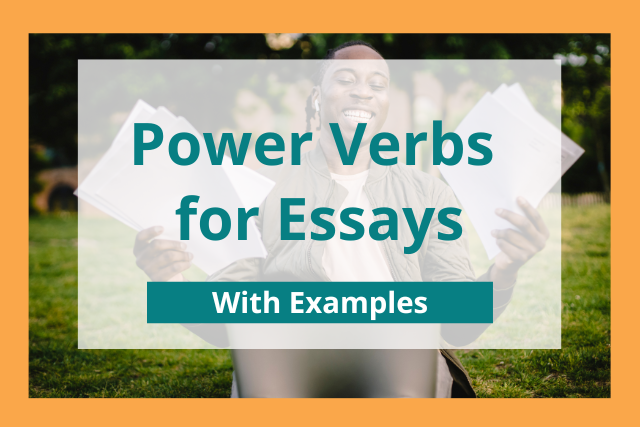
Adding power verbs to your academic paper will improve your reader’s experience and bring more impact to the arguments you make.
While the arguments themselves are the most important elements of any successful academic paper, the structure of those arguments and the language that is used influence how the paper is received.
Academic papers have strict formal rules, but as long as these are followed, there is still plenty of scope to make the key points of the paper stand out through effective use of language and more specifically, the effective use of power verbs.
Power verbs are verbs that indicate action and have a more positive and confident tone. Using them brings strength and confidence to the arguments you are making, while also bringing variation to your sentences and making your writing more interesting to the reader.
The best academic papers will use such verbs to support their arguments or concepts, so it is important that your paper contains at least three power verbs.
ProWritingAid will check your writing for power verbs and will notify you if you have less than three throughout your whole academic paper.
Power Verbs Boost Ideas
Examples of power verbs.
Academic papers of all disciplines are often filled with overlong and complicated sentences that are attempting to convey specific ideas and concepts. Active and powerful verbs are useful both to the reader and the author of the paper.
For the reader who is trying to tackle these ideas and concepts, the power verbs provide clarity and purpose. Compare the following sentences:
- This paper will say that there were two reasons for the start of the civil war.
- This paper asserts that there were two reasons for the start of the civil war.
Clearly the second sentence is more confident, direct, and authoritative because it has replaced the dull ‘says’ with ‘asserts.’ For the writer, the power verb expresses confidence in the idea being presented.
The following are examples of power verbs that are useful in academic writing, both for supporting an argument and for allowing you to vary the language you use.
Power Verbs for Analysis: appraise, define, diagnose, examine, explore, identify, interpret, investigate, observe.
Power Verbs to Introduce a Topic: investigate, outline, survey, question, feature.
Power Verbs to Agree with Existing Studies: indicate, suggest, confirm, corroborate, underline, identify, impart, maintain, substantiate, support, validate, acknowledge, affirm, assert.
Power Verbs to Disagree with Existing Studies: reject, disprove, debunk, question, challenge, invalidate, refute, deny, dismiss, disregard, object to, oppose.
Power Verbs to Infer: extract, approximate, surmise, deduce.
Power Verbs for Cause and Effect : impacts, compels, generates, incites, influences, initiates, prompts, stimulates, provokes, launches, introduces, advances.
Legal Power Verbs: sanctions, consents, endorses, disallows, outlaws, prohibits, precludes, protects, bans, licenses, authorizes.
Power Verbs that Say: convey, comment, state, establish, elaborate, identify, propose.
Power Verbs that Show: reveal, display, highlight, depict, portray, illustrate.

Be confident about grammar
Check every email, essay, or story for grammar mistakes. Fix them before you press send.
The most successful people in the world have coaches. Whatever your level of writing, ProWritingAid will help you achieve new heights. Exceptional writing depends on much more than just correct grammar. You need an editing tool that also highlights style issues and compares your writing to the best writers in your genre. ProWritingAid helps you find the best way to express your ideas.
Get started with ProWritingAid
Drop us a line or let's stay in touch via :
Home — Essay Samples — Science — Language — The Power of Language: How Words Shape Our World
The Power of Language: How Words Shape Our World
- Categories: Language
About this sample

Words: 795 |
Published: Sep 7, 2023
Words: 795 | Pages: 2 | 4 min read
Table of contents
The essence of language and communication, the complex relationship between language and power, using language to promote transparency, accountability, and equity.

Cite this Essay
Let us write you an essay from scratch
- 450+ experts on 30 subjects ready to help
- Custom essay delivered in as few as 3 hours
Get high-quality help

Dr Jacklynne
Verified writer
- Expert in: Science

+ 120 experts online
By clicking “Check Writers’ Offers”, you agree to our terms of service and privacy policy . We’ll occasionally send you promo and account related email
No need to pay just yet!
Related Essays
2 pages / 1037 words
2 pages / 806 words
1 pages / 490 words
1 pages / 567 words
Remember! This is just a sample.
You can get your custom paper by one of our expert writers.
121 writers online
Still can’t find what you need?
Browse our vast selection of original essay samples, each expertly formatted and styled
Related Essays on Language
Theodore Roethke's poem "My Papa's Waltz" is a poignant exploration of the complex relationship between a father and his son. The poem depicts a scene in which a young boy dances with his father, but the dance is not a graceful [...]
One of the key components of culture is the distinction between material and nonmaterial culture. In this essay, we will explore the differences between these two aspects of culture, and the role they play in shaping human [...]
Have you ever noticed how certain words or phrases can subtly influence our perceptions and opinions? This phenomenon, known as slanted language, plays a significant role in shaping our understanding of various issues and [...]
Communication is not just about the words we speak; it also involves the use of nonverbal cues such as language. language plays a crucial role in conveying our thoughts, feelings, and intentions to others. In fact, research [...]
Medical Terminology is language used to describe the human body, extensive and rich history in Latin and Greek languages. Both cultures merged, resulting in medical concepts regarding in disease treatment and containment. The [...]
The qualitative study of Landmark and her team was participated by Norwegian physicians and patients as they explored series of recordings of physician’s prescribed therapy to their respective patients. Through these records, [...]
Related Topics
By clicking “Send”, you agree to our Terms of service and Privacy statement . We will occasionally send you account related emails.
Where do you want us to send this sample?
By clicking “Continue”, you agree to our terms of service and privacy policy.
Be careful. This essay is not unique
This essay was donated by a student and is likely to have been used and submitted before
Download this Sample
Free samples may contain mistakes and not unique parts
Sorry, we could not paraphrase this essay. Our professional writers can rewrite it and get you a unique paper.
Please check your inbox.
We can write you a custom essay that will follow your exact instructions and meet the deadlines. Let's fix your grades together!
Get Your Personalized Essay in 3 Hours or Less!
We use cookies to personalyze your web-site experience. By continuing we’ll assume you board with our cookie policy .
- Instructions Followed To The Letter
- Deadlines Met At Every Stage
- Unique And Plagiarism Free
The power of words

Can you imagine a world without words?
It would be chaos.
Many times we take them for granted, just as a way of communicating what we want or need. And they actually do that, but at the same time they do something bigger.
Words are powerful. Whether you write or speak them, they do have an impact on you and the others. They express feelings and share knowledge. They can change someones mood completely and ignite a spark in them.
That´s why writing is an extraordinary experience. It´s not just jotting down symbols that form words, it’s a way of expressing what you feel or think. Hence why you should really think before speaking. Once the words are out, they never come back. If you want to expand motivation and peace, your words should reflect that, they should be positive. Otherwise, you would be doing the exact opposite.
Everyone should try writing at least once. It doesn´t matter the topic, or if you want to share it with others, but you should just sit down and take all those thoughts out your head. In that way, you´ll have less going on in your mind and they will probably make more sense to you once you see them.
If you want to test how powerful words are, try for a week saying positive phrases to yourself in front of the mirror, and you´ll soon see a change in your mood and the way you act.
View the discussion thread.
Related Stories

Guarding Our Communities: The Imperative of Immunization

🔴 A Red Letter To The Youth: A Call to Action 🔴

Mental Health and Self-Care

C 2019 Voices of Youth. All Rights Reserved.
- Share full article
Advertisement
Supported by
The Big IDEAS: What is power?
The Sacred Spell of Words
Power is language.

By N. Scott Momaday
Mr. Momaday is an author, poet and playwright.
This is the first essay in The Big Ideas, a special section of The Times’s philosophy series, The Stone , in which more than a dozen notable thinkers and writers — including Elena Ferrante, Cornel West, Yuval Harari, Gen. Wesley Clark and others — answer the question, “What is power?”
The term “power” is everywhere in our world. Thinking of it, the phrase “word inflation” comes to mind. Much of what we encounter in print, on television and in advertising centers on the concept of power.
But what is that concept? What is power? The truth is that the word bears an impossible burden of interpretation. Definitions are myriad; the dictionary lists an unusual number of meanings. Surely power is what it is — that which enables us to influence, if not indeed determine, the course of our lives.
And it is a word.
Words are powerful. As a writer, my experience tells me that nothing is more powerful. Language, after all, is made of words.
Words are conceptual symbols; they have denotative and connotative properties. The word “power” denotes force, physical strength, resistance. But it connotes something more subtle: persuasion, suggestion, inspiration, security.
We are having trouble retrieving the article content.
Please enable JavaScript in your browser settings.
Thank you for your patience while we verify access. If you are in Reader mode please exit and log into your Times account, or subscribe for all of The Times.
Thank you for your patience while we verify access.
Already a subscriber? Log in .
Want all of The Times? Subscribe .
- Entertainment
- Environment
- Information Science and Technology
- Social Issues
Home Essay Samples Literature The Book Thief
The Power Of Words In "The Book Thief" by Markus Zusak
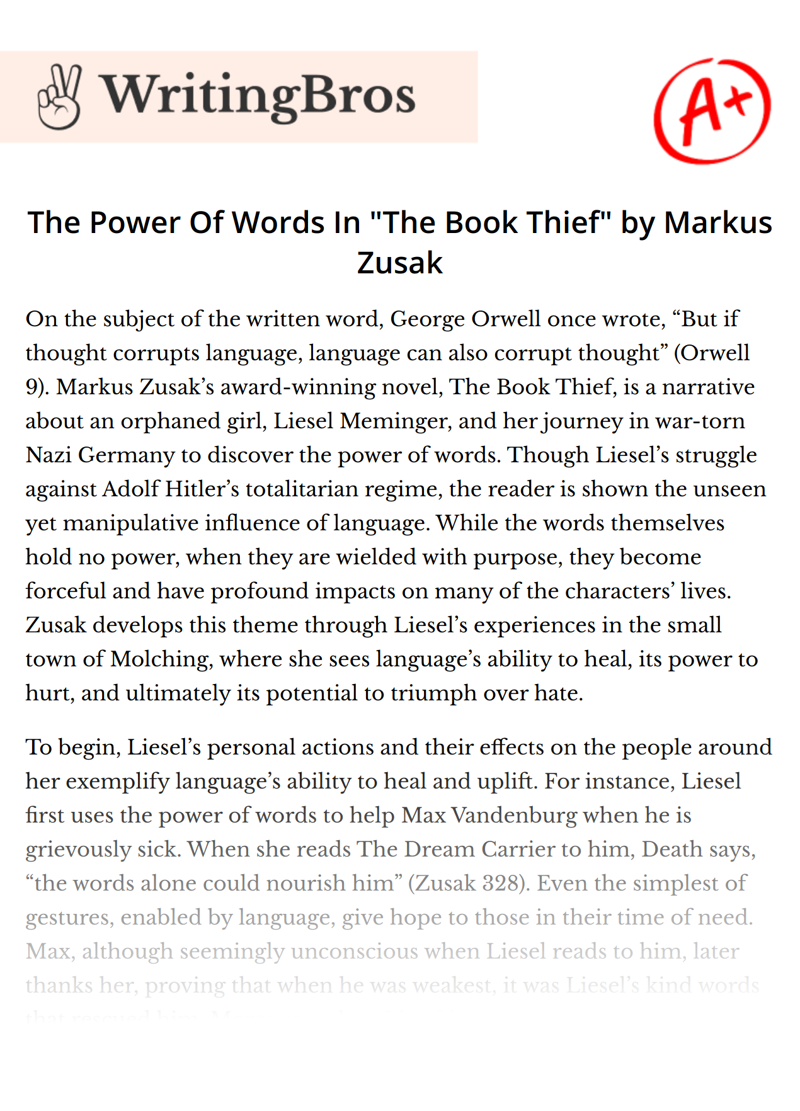
*minimum deadline
Cite this Essay
To export a reference to this article please select a referencing style below

- The Adventures of Tom Sawyer
- Chronicle of a Death Foretold
- The Duchess of Malfi
- William Golding
Related Essays
Need writing help?
You can always rely on us no matter what type of paper you need
*No hidden charges
100% Unique Essays
Absolutely Confidential
Money Back Guarantee
By clicking “Send Essay”, you agree to our Terms of service and Privacy statement. We will occasionally send you account related emails
You can also get a UNIQUE essay on this or any other topic
Thank you! We’ll contact you as soon as possible.
The Power of Persuasion: Understanding the Definition of Rhetoric
This essay about the mastery of persuasion explores the art of rhetoric and its historical significance. It highlights the fundamental elements of rhetoric—ethos, pathos, and logos—and their roles in effective communication. The essay underscores rhetoric’s power to influence emotions, establish credibility, and appeal to logic, illustrating its pervasive impact on human interaction, politics, and daily life. By mastering rhetoric, individuals can advocate for their beliefs and drive positive change.
How it works
In the vast tapestry of human interaction, there exists an art form of immense potency — the mastery of persuasion. It’s a skill as old as civilization itself, intricately woven into the fabric of societies, guiding opinions, steering decisions, and sculpting the course of history. At its core lies rhetoric, a term rich with history and profound significance.
Rhetoric, fundamentally, is the craft of effective communication, particularly the adept use of language to sway and influence others. It’s the tool through which ideas are sculpted, arguments are forged, and convictions are molded.
Rooted deeply in ancient Greek tradition, rhetoric was considered one of the foundational skills for any learned individual, alongside grammar and logic. Aristotle, the eminent philosopher of antiquity, defined rhetoric as “the faculty of observing in any given case the available means of persuasion.” This definition encapsulates the essence of rhetoric — the strategic use of language to guide an audience towards a specific viewpoint.
The persuasive might inherent in rhetoric lies in its capacity to appeal to the emotions, intellect, and values of the audience. It’s not just about presenting facts and reasoned arguments; rather, it’s about crafting a compelling narrative that resonates deeply. This is achieved through a mastery of diverse rhetorical devices — from the skillful use of imagery and metaphor to the nuanced manipulation of tone and rhythm.
Ethos, or the appeal to the character and credibility of the speaker, stands as a pivotal element of rhetoric. In persuasion, establishing trust and authority is paramount. A speaker perceived as knowledgeable, sincere, and reliable holds greater sway over an audience. This is why politicians, advertisers, and public figures often endeavor to cultivate a strong ethos, be it through showcasing expertise, citing reputable sources, or aligning with values shared by their audience.
Pathos, the appeal to the emotions of the audience, represents another vital facet of rhetoric. Humans are not purely rational beings; our decisions are often swayed by our emotions. Rhetoric acknowledges this fundamental aspect of human nature and leverages it to great effect. By tapping into the audience’s emotions — whether it’s fear, anger, joy, or hope — a skilled rhetorician can forge a profound connection and spur them to action.
Lastly, there’s logos, the appeal to reason and logic. While emotions play a significant role in persuasion, they must be underpinned by sound reasoning and evidence. Logical arguments provide the bedrock upon which persuasive appeals are constructed. This entails presenting facts, statistics, and logical deductions in a lucid and compelling manner. Without logos, rhetoric risks being perceived as mere manipulation or propaganda.
Yet, rhetoric is not solely a tool of manipulation; it’s also a vehicle for empowerment. By mastering the art of persuasion, individuals can articulate their ideas more effectively, advocate for causes they believe in, and effect positive change in the world. In the realm of politics, rhetoric has been instrumental in rallying support for social movements, galvanizing public opinion, and shaping the course of history.
Moreover, rhetoric permeates every facet of our daily lives, from advertising and marketing to interpersonal communication and negotiation. Its principles are at play whenever we seek to influence or persuade others. Whether it’s persuading a friend to try a new restaurant or convincing a colleague to support a project, the power of rhetoric is constantly at work, shaping our interactions and our world.
In conclusion, rhetoric stands as a potent force that molds our perceptions, beliefs, and actions. It’s the art of persuasion, refined over millennia by philosophers, orators, and leaders. By grasping the essence of rhetoric and mastering its techniques, we can become more effective communicators, more persuasive advocates, and more empowered individuals. In a world where ideas vie for attention and influence, the potency of rhetoric is more relevant and indispensable than ever.
Cite this page
The Power of Persuasion: Understanding the Definition of Rhetoric. (2024, Jun 17). Retrieved from https://papersowl.com/examples/the-power-of-persuasion-understanding-the-definition-of-rhetoric/
"The Power of Persuasion: Understanding the Definition of Rhetoric." PapersOwl.com , 17 Jun 2024, https://papersowl.com/examples/the-power-of-persuasion-understanding-the-definition-of-rhetoric/
PapersOwl.com. (2024). The Power of Persuasion: Understanding the Definition of Rhetoric . [Online]. Available at: https://papersowl.com/examples/the-power-of-persuasion-understanding-the-definition-of-rhetoric/ [Accessed: 18 Jun. 2024]
"The Power of Persuasion: Understanding the Definition of Rhetoric." PapersOwl.com, Jun 17, 2024. Accessed June 18, 2024. https://papersowl.com/examples/the-power-of-persuasion-understanding-the-definition-of-rhetoric/
"The Power of Persuasion: Understanding the Definition of Rhetoric," PapersOwl.com , 17-Jun-2024. [Online]. Available: https://papersowl.com/examples/the-power-of-persuasion-understanding-the-definition-of-rhetoric/. [Accessed: 18-Jun-2024]
PapersOwl.com. (2024). The Power of Persuasion: Understanding the Definition of Rhetoric . [Online]. Available at: https://papersowl.com/examples/the-power-of-persuasion-understanding-the-definition-of-rhetoric/ [Accessed: 18-Jun-2024]
Don't let plagiarism ruin your grade
Hire a writer to get a unique paper crafted to your needs.

Our writers will help you fix any mistakes and get an A+!
Please check your inbox.
You can order an original essay written according to your instructions.
Trusted by over 1 million students worldwide
1. Tell Us Your Requirements
2. Pick your perfect writer
3. Get Your Paper and Pay
Hi! I'm Amy, your personal assistant!
Don't know where to start? Give me your paper requirements and I connect you to an academic expert.
short deadlines
100% Plagiarism-Free
Certified writers
Paraphrasing Tool
Paraphrasing Tool in partnership with QuillBot. Paraphrase everywhere with the free Chrome Extension .
Try our other writing services

Avoid plagiarism in your paraphrased text
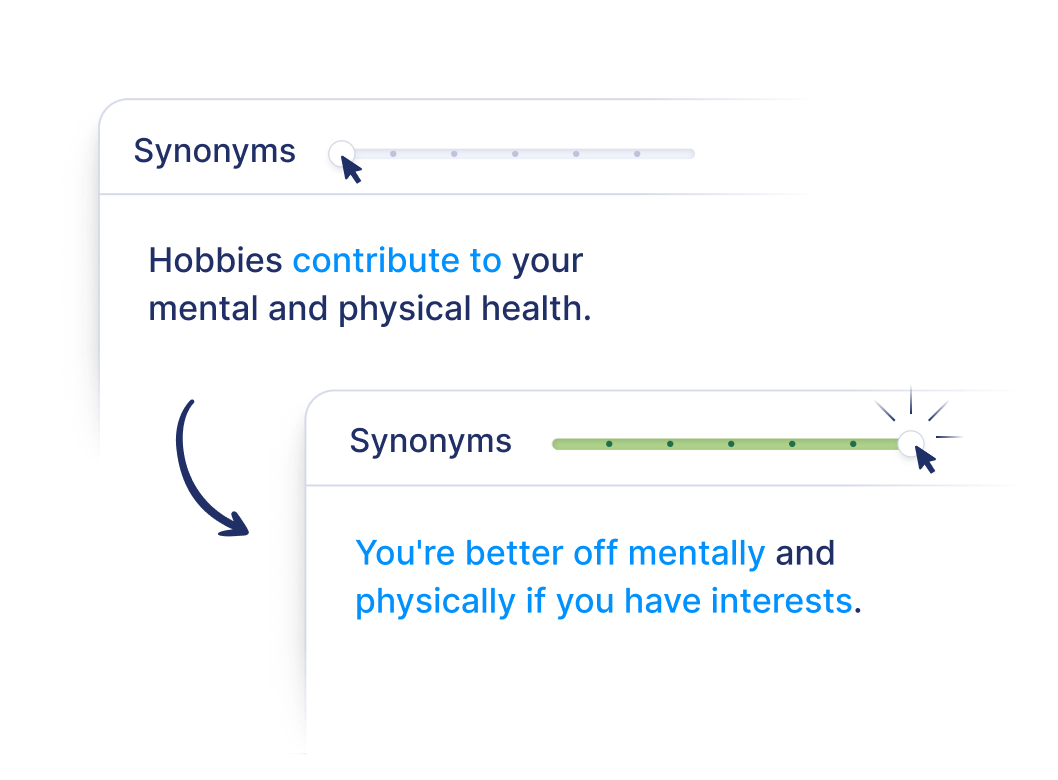
What is a paraphrasing tool?
This AI-powered paraphrasing tool lets you rewrite text in your own words. Use it to paraphrase articles, essays, and other pieces of text. You can also use it to rephrase sentences and find synonyms for individual words. And the best part? It’s all 100% free!
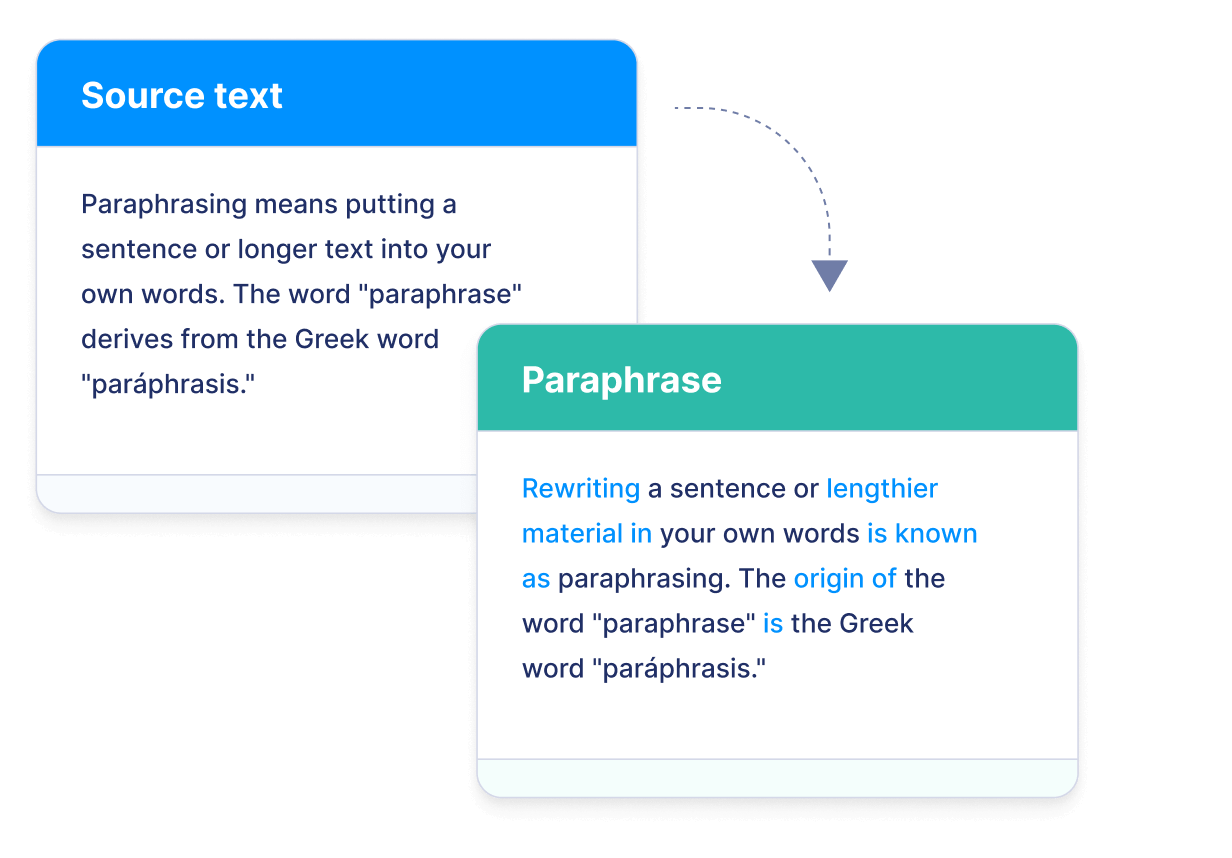
What is paraphrasing?
Paraphrasing involves expressing someone else’s ideas or thoughts in your own words while maintaining the original meaning. Paraphrasing tools can help you quickly reword text by replacing certain words with synonyms or restructuring sentences. They can also make your text more concise, clear, and suitable for a specific audience. Paraphrasing is an essential skill in academic writing and professional communication.

Why use this paraphrasing tool?
- Save time: Gone are the days when you had to reword sentences yourself; now you can rewrite an individual sentence or a complete text with one click.
- Improve your writing: Your writing will always be clear and easy to understand. Automatically ensure consistent language throughout.
- Preserve original meaning: Paraphrase without fear of losing the point of your text.
- No annoying ads: We care about the user experience, so we don’t run any ads.
- Accurate: Reliable and grammatically correct paraphrasing.
- No sign-up required: We don’t need your data for you to use our paraphrasing tool.
- Super simple to use: A simple interface even your grandma could use.
- It’s 100% free: No hidden costs, just unlimited use of a free paraphrasing tool.
People are in love with our paraphrasing tool

No Signup Needed
You don’t have to register or sign up. Insert your text and get started right away.

The Paraphraser is Ad-Free
Don’t wait for ads or distractions. The paraphrasing tool is ad-free!

Multi-lingual
Use our paraphraser for texts in different languages.
Features of the paraphrasing tool
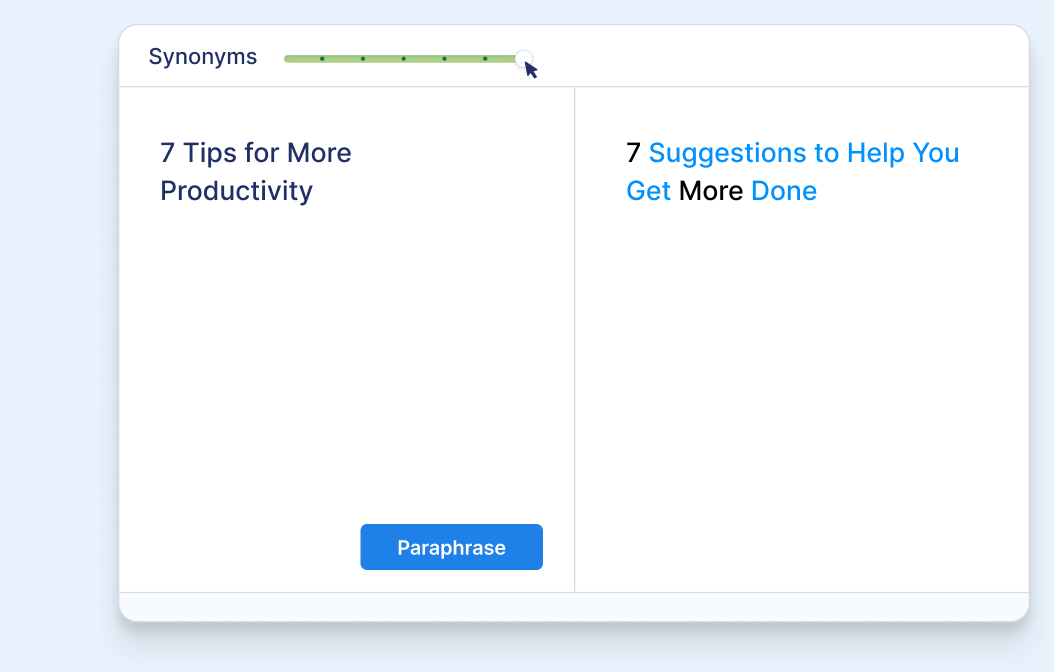
Rephrase individual sentences
With the Scribbr Paraphrasing Tool, you can easily reformulate individual sentences.
- Write varied headlines
- Rephrase the subject line of an email
- Create unique image captions
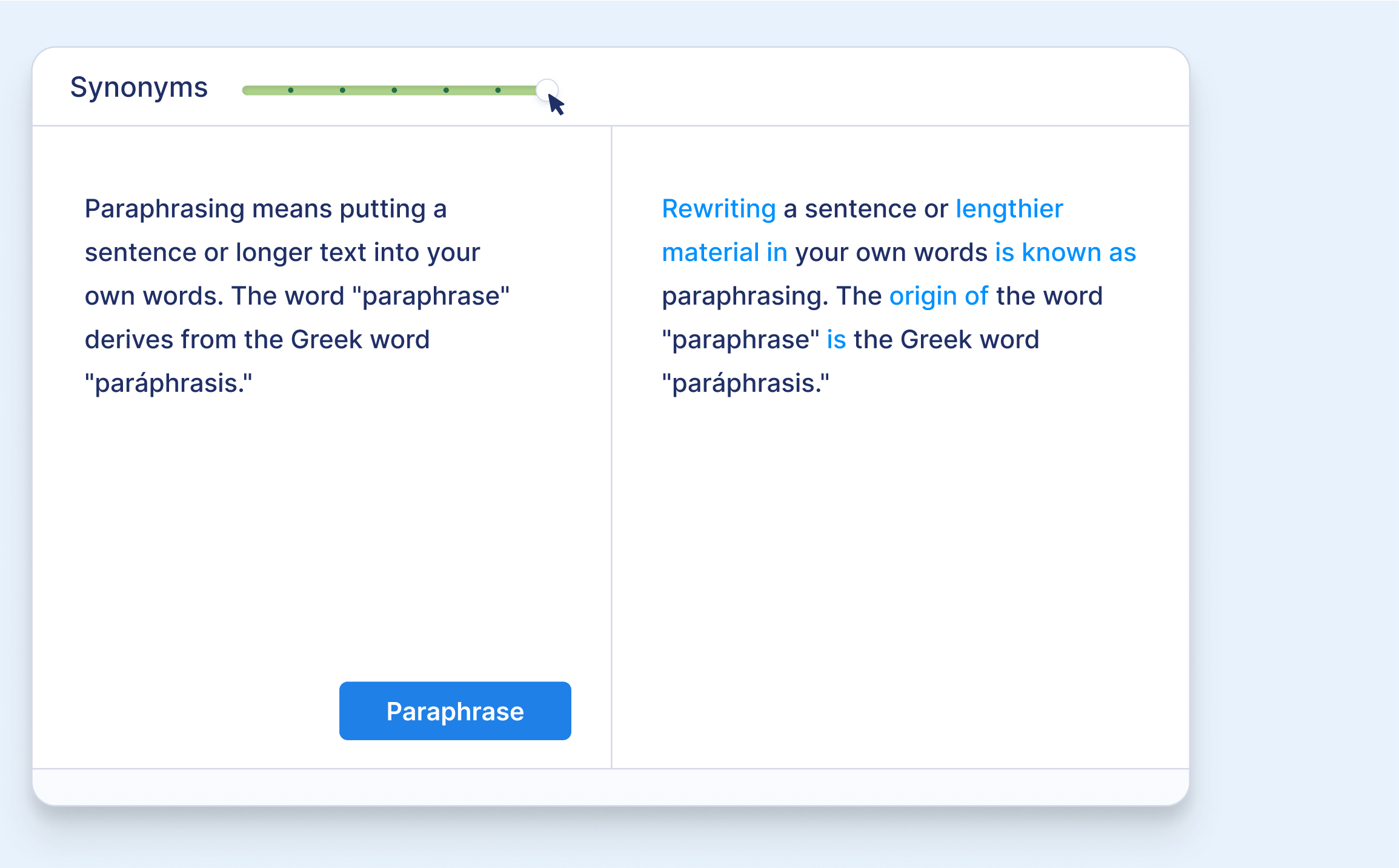
Paraphrase a whole text
Our paraphraser can also help with longer passages (up to 125 words per input). Upload your document or copy your text into the input field.
With one click, you can reformulate the entire text.

Find synonyms with ease
Simply click on any word to open the interactive thesaurus.
- Choose from a list of suggested synonyms
- Find the synonym with the most appropriate meaning
- Replace the word with a single click
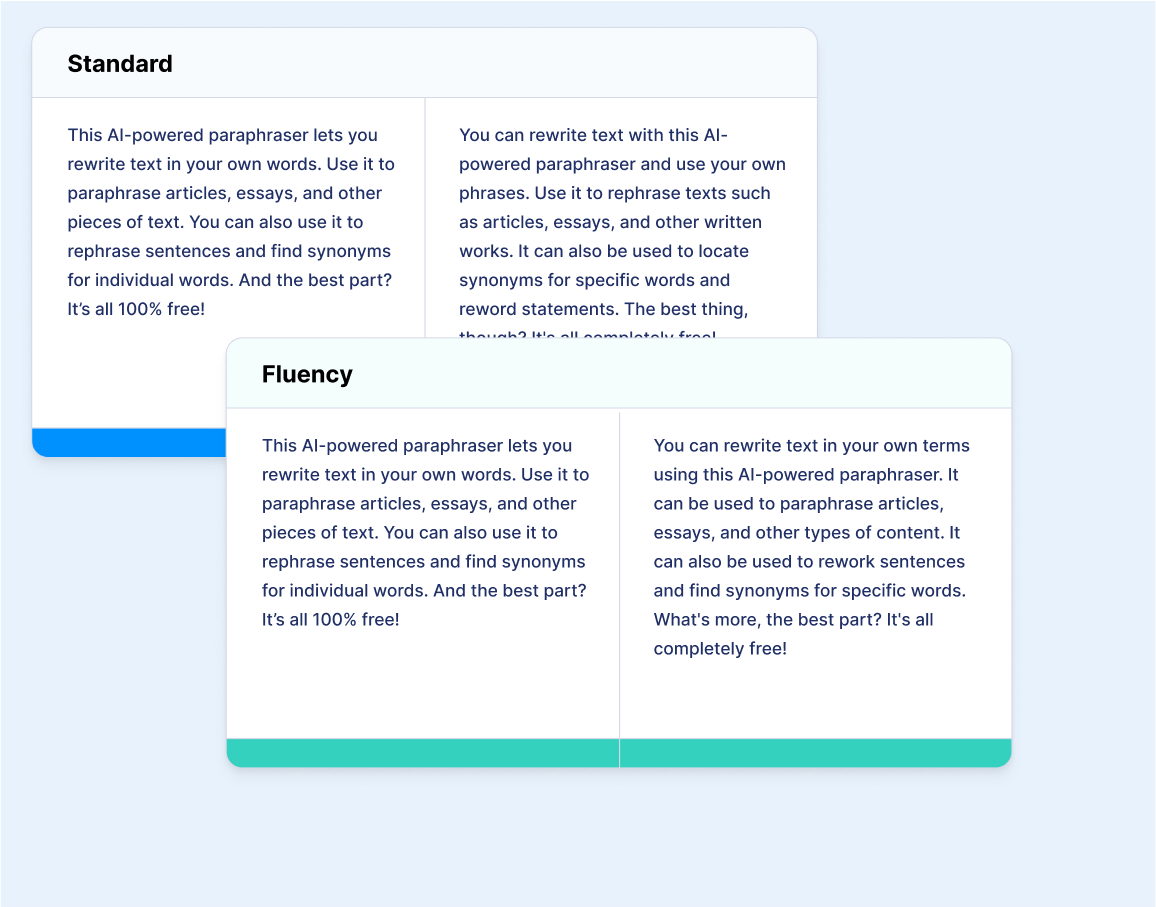
Paraphrase in two ways
- Standard: Offers a compromise between modifying and preserving the meaning of the original text
- Fluency: Improves language and corrects grammatical mistakes
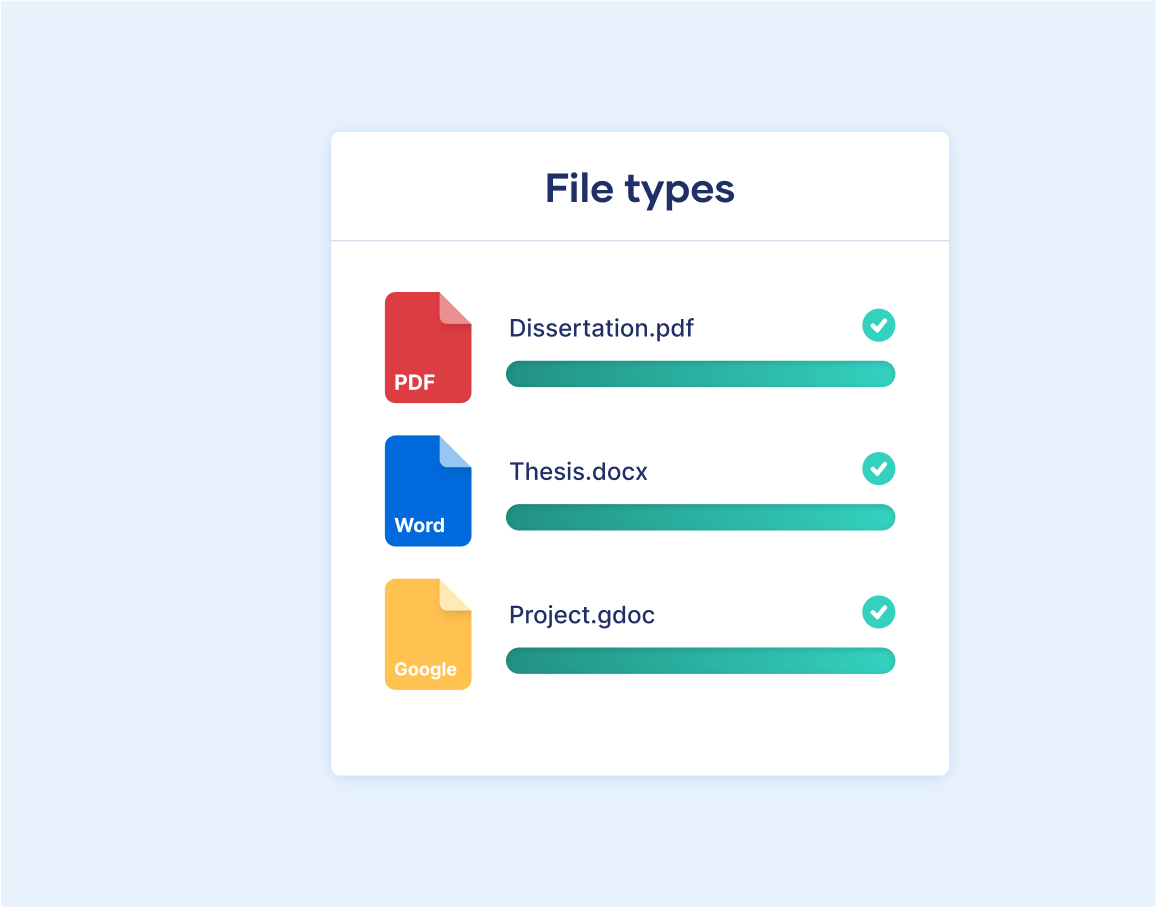
Upload different types of documents
Upload any Microsoft Word document, Google Doc, or PDF into the paraphrasing tool.
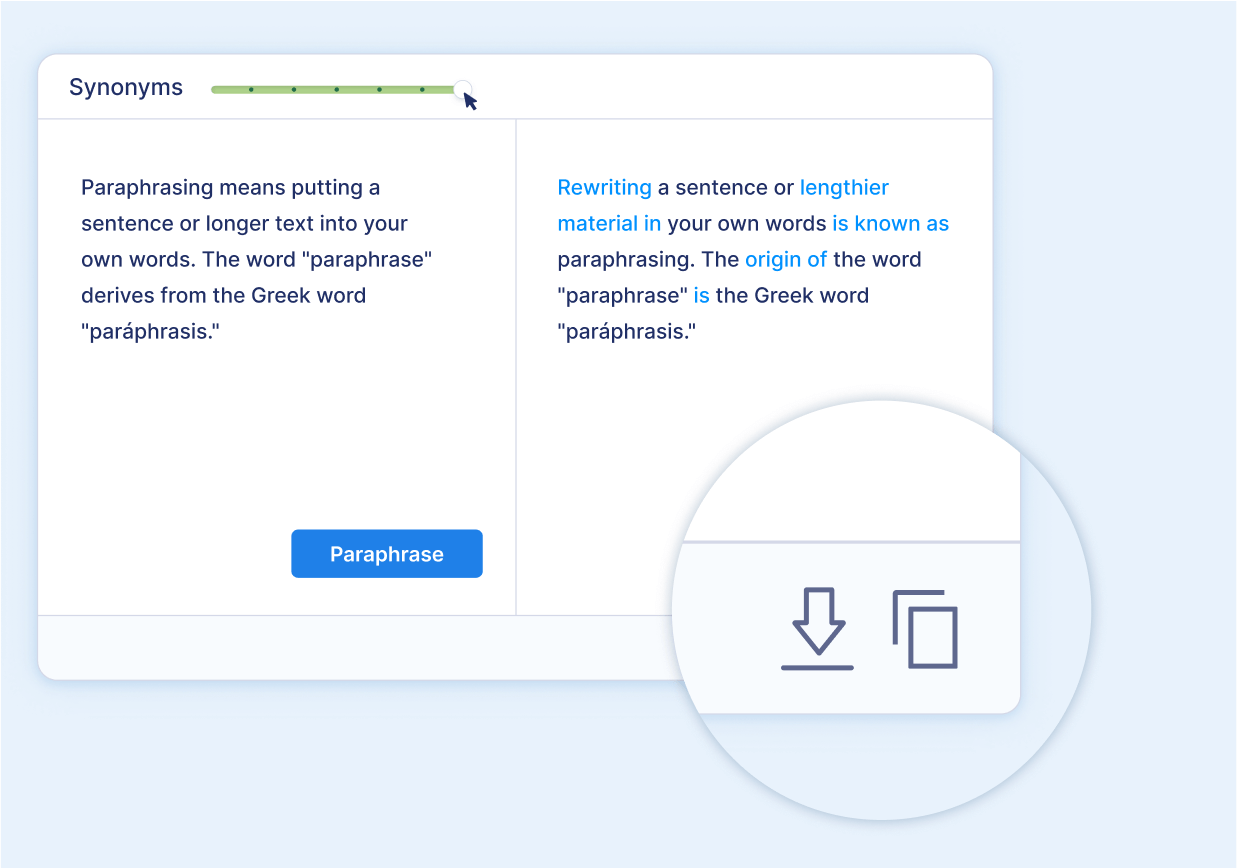
Download or copy your results
After you’re done, you can easily download or copy your text to use somewhere else.

Powered by AI
The paraphrasing tool uses natural language processing to rewrite any text you give it. This way, you can paraphrase any text within seconds.
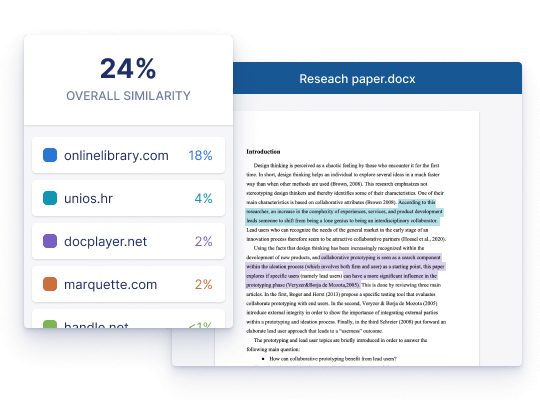
Avoid accidental plagiarism
Want to make sure your document is plagiarism-free? In addition to our paraphrasing tool, which will help you rephrase sentences, quotations, or paragraphs correctly, you can also use our anti-plagiarism software to make sure your document is unique and not plagiarized.
Scribbr’s anti-plagiarism software enables you to:
- Detect plagiarism more accurately than other tools
- Ensure that your paraphrased text is valid
- Highlight the sources that are most similar to your text
Start for free
How does this paraphrasing tool work?
1. put your text into the paraphraser, 2. select your method of paraphrasing, 3. select the quantity of synonyms you want, 4. edit your text where needed, who can use this paraphrasing tool.

Paraphrasing tools can help students to understand texts and improve the quality of their writing.

Create original lesson plans, presentations, or other educational materials.
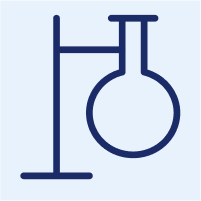
Researchers
Explain complex concepts or ideas to a wider audience.

Journalists
Quickly and easily rephrase text to avoid repetitive language.

Copywriters
By using a paraphrasing tool, you can quickly and easily rework existing content to create something new and unique.

Bloggers can rewrite existing content to make it their own.

Writers who need to rewrite content, such as adapting an article for a different context or writing content for a different audience.

A paraphrasing tool lets you quickly rewrite your original content for each medium, ensuring you reach the right audience on each platform.
The all-purpose paraphrasing tool
The Scribbr Paraphrasing Tool is the perfect assistant in a variety of contexts.

Brainstorming
Writer’s block? Use our paraphraser to get some inspiration.

Professional communication
Produce creative headings for your blog posts or PowerPoint slides.

Academic writing
Paraphrase sources smoothly in your thesis or research paper.

Social media
Craft memorable captions and content for your social media posts.
Paraphrase text online, for free
The Scribbr Paraphrasing Tool lets you rewrite as many sentences as you want—for free.
| 💶 100% free | Rephrase as many texts as you want |
|---|---|
| 🟢 No login | No registration needed |
| 📜 Sentences & paragraphs | Suitable for individual sentences or whole paragraphs |
| 🖍️ Choice of writing styles | For school, university, or work |
| ⭐️ Rating | based on 13,185 reviews |
Write with 100% confidence 👉
Scribbr & academic integrity.
Scribbr is committed to protecting academic integrity. Our plagiarism checker , AI Detector , Citation Generator , proofreading services , paraphrasing tool, grammar checker , summarizer , and free Knowledge Base content are designed to help students produce quality academic papers.
Ask our team
Want to contact us directly? No problem. We are always here for you.
- Email [email protected]
- Start live chat
- Call +1 (510) 822-8066
- WhatsApp +31 20 261 6040

Frequently asked questions
The act of putting someone else’s ideas or words into your own words is called paraphrasing, rephrasing, or rewording. Even though they are often used interchangeably, the terms can mean slightly different things:
Paraphrasing is restating someone else’s ideas or words in your own words while retaining their meaning. Paraphrasing changes sentence structure, word choice, and sentence length to convey the same meaning.
Rephrasing may involve more substantial changes to the original text, including changing the order of sentences or the overall structure of the text.
Rewording is changing individual words in a text without changing its meaning or structure, often using synonyms.
It can. One of the two methods of paraphrasing is called “Fluency.” This will improve the language and fix grammatical errors in the text you’re paraphrasing.
Paraphrasing and using a paraphrasing tool aren’t cheating. It’s a great tool for saving time and coming up with new ways to express yourself in writing. However, always be sure to credit your sources. Avoid plagiarism.
If you don’t properly cite text paraphrased from another source, you’re plagiarizing. If you use someone else’s text and paraphrase it, you need to credit the original source. You can do that by using citations. There are different styles, like APA, MLA, Harvard, and Chicago. Find more information about citing sources here.
Paraphrasing without crediting the original author is a form of plagiarism , because you’re presenting someone else’s ideas as if they were your own.
However, paraphrasing is not plagiarism if you correctly cite the source . This means including an in-text citation and a full reference, formatted according to your required citation style .
As well as citing, make sure that any paraphrased text is completely rewritten in your own words.
Plagiarism means using someone else’s words or ideas and passing them off as your own. Paraphrasing means putting someone else’s ideas in your own words.
So when does paraphrasing count as plagiarism?
- Paraphrasing is plagiarism if you don’t properly credit the original author.
- Paraphrasing is plagiarism if your text is too close to the original wording (even if you cite the source). If you directly copy a sentence or phrase, you should quote it instead.
- Paraphrasing is not plagiarism if you put the author’s ideas completely in your own words and properly cite the source .
Try our services
- SUGGESTED TOPICS
- The Magazine
- Newsletters
- Managing Yourself
- Managing Teams
- Work-life Balance
- The Big Idea
- Data & Visuals
- Reading Lists
- Case Selections
- HBR Learning
- Topic Feeds
- Account Settings
- Email Preferences
Build a Corporate Culture That Works

There’s a widespread understanding that managing corporate culture is key to business success. Yet few companies articulate their culture in such a way that the words become an organizational reality that molds employee behavior as intended.
All too often a culture is described as a set of anodyne norms, principles, or values, which do not offer decision-makers guidance on how to make difficult choices when faced with conflicting but equally defensible courses of action.
The trick to making a desired culture come alive is to debate and articulate it using dilemmas. If you identify the tough dilemmas your employees routinely face and clearly state how they should be resolved—“In this company, when we come across this dilemma, we turn left”—then your desired culture will take root and influence the behavior of the team.
To develop a culture that works, follow six rules: Ground your culture in the dilemmas you are likely to confront, dilemma-test your values, communicate your values in colorful terms, hire people who fit, let culture drive strategy, and know when to pull back from a value statement.
Start by thinking about the dilemmas your people will face.
Idea in Brief
The problem.
There’s a widespread understanding that managing corporate culture is key to business success. Yet few companies articulate their corporate culture in such a way that the words become an organizational reality that molds employee behavior as intended.
What Usually Happens
How to fix it.
Follow six rules: Ground your culture in the dilemmas you are likely to confront, dilemma-test your values, communicate your values in colorful terms, hire people who fit, let culture drive strategy, and know when to pull back from a value.
At the beginning of my career, I worked for the health-care-software specialist HBOC. One day, a woman from human resources came into the cafeteria with a roll of tape and began sticking posters on the walls. They proclaimed in royal blue the company’s values: “Transparency, Respect, Integrity, Honesty.” The next day we received wallet-sized plastic cards with the same words and were asked to memorize them so that we could incorporate them into our actions. The following year, when management was indicted on 17 counts of conspiracy and fraud, we learned what the company’s values really were.
- EM Erin Meyer is a professor at INSEAD, where she directs the executive education program Leading Across Borders and Cultures. She is the author of The Culture Map: Breaking Through the Invisible Boundaries of Global Business (PublicAffairs, 2014) and coauthor (with Reed Hastings) of No Rules Rules: Netflix and the Culture of Reinvention (Penguin, 2020). ErinMeyerINSEAD
Partner Center
Today's NYT Connections Hints and Solution (Friday, June 14, 2024)

Your changes have been saved
Email Is sent
Please verify your email address.
You’ve reached your account maximum for followed topics.
Quick Links
Category clues for today's connections (#369), today's connections solution (june 14, 2024), how i solved today's connections puzzle, our top tips to beat connections every day.
Connections requires players to find the connections between 16 words, and place them in four groups of four. If you want some help, we have the solution to Connections for Friday, June 14, 2024, along with hints to help you solve it yourself.
SPOILERS AHEAD (CLUES)
Today, as every day, you need to split the 16 words that make up the Connections puzzle grid into four groups of four based on specific categories. It isn't as easy as it sounds. Fortunately, we're on hand to help you solve today's Connections puzzle .
If you want to jump straight to today's Connections solution, scroll past the next spoiler warning. However, if you'd rather see some hints designed to help you solve it without giving the answers away first:
- Yellow: "Work that short-form writers produce"
- Green: "A singer with a name that's also a color would belong here"
- Blue: "Charlie Lima Uniform Echo is a clue, literally"
- Purple: "Almost but not quite number one"
SPOILERS AHEAD (CATEGORIES)
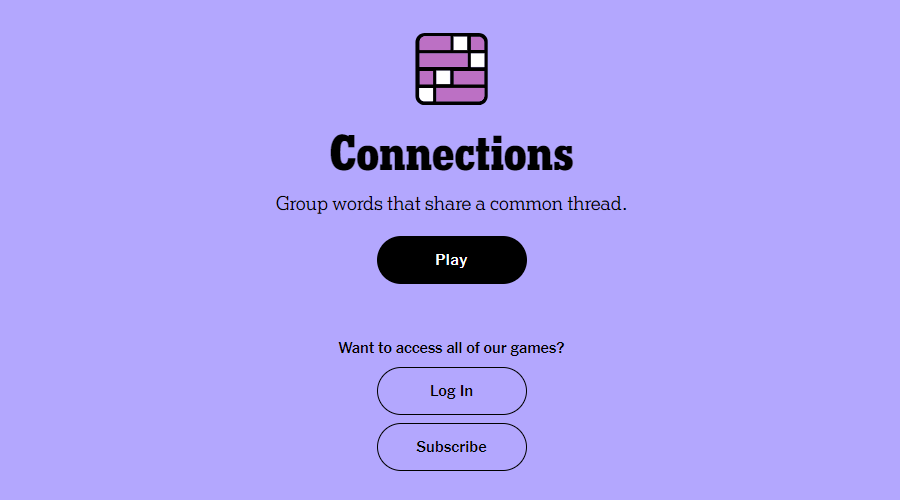
If those clues aren't enough, and you're still struggling to beat Connections #369 without running out of mistakes, here is the answer...
Today's Connections Categories
- Yellow = "Writing Assignments"
- Green = "Things That Are Pink"
- Blue = "NATO Phonetic Alphabet"
- Purple = "Associated With #2"
With the categories revealed, you should try to guess which words belong where. There are 16 words in total, with four belonging to each category.
If you are still stuck despite knowing the names of each category, continue scrolling down for the 16 words organized into their respective categories.
SPOILERS AHEAD (SOLUTION)
Today's Connections Solution
- Yellow: "Writing Assignments" = ARTICLE, ESSAY, PAPER, REPORT
- Green: "Things That Are Pink" = BUBBLE GUM, CARNATION, ERASER, FLAMINGO
- Blue: "NATO Phonetic Alphabet" = FOXTROT, HOTEL, VICTOR, YANKEE
- Purple: "Associated With #2" = DEPUTY, DEREK JETER, PENCIL, SILVER MEDAL
Takeaways from solving today's Connections...
- The most obvious red herrings are "pencil," "paper," and "eraser" as three words associated with writing or drawing. There's also "Derek Jeter" and "Yankee," as the former spent his whole baseball career as a New York Yankee.
- I found the Purple category impossible today, mainly as a result of being British. For starters, I didn't know who Derek Jeter was before Googling his name. I also didn't immediately think of #2 when I saw "pencil," as outside the US, pencils are graded on an HB scale. So it's a good job that these were the only four words left after solving the other categories.
- Shuffle the words as many times as you need. Shuffling the words around means you're more likely to spot the connections.
- Look for differences as well as similarities. The NYT is trying to trip you up, so look for what divides the words with similar meanings.
- Take your time, and don't rush into a guess. Connections isn't a timed challenge, so you have the luxury of planning everything out.
- Look for common themes over time. The more you play Connections, the more you'll spot recurring themes cropping up regularly.
- Tune into the NYT editors' way of thinking. It's the puzzle setters you're competing against, so you need to understand their game plan.
Now that you have completed today's Connections puzzle (with a little help from your friends at MUO), you should check out some of the other free games from the New York Times.
Wordle is the best-known of them all, and challenges you to find a 5-letter word within six guesses. For every letter you find, you get told if it's in the correct place, allowing you to whittle down the possible options. If you need help with Wordle, check out our tips and tricks to improve your Wordle score .
There's also Strands, the newest addition to the New York Times' burgeoning list of games. Just like Connections, it's extremely challenging, but in a unique string-the-letters-together way. We recommend you check out our best tips for beating Strands to give yourself a leg up on the daily challenge.
Or, if you're really only into Connections but want more tips than are offered above, check out our longer list of Connections tips and tricks .
- Puzzle Games

COMMENTS
Here's how to use each word or phrase linked to this category: 11. For instance - Introduces a specific example that illuminates a broader point, helping to clarify complex ideas. 12. For example - Functions similarly to "for instance," offering a direct illustration to support or demonstrate a claim. 13.
Writing is a series of choices. As you work on a paper, you choose your topic, your approach, your sources, and your thesis; when it's time to write, you have to choose the words you will use to express your ideas and decide how you will arrange those words into sentences and paragraphs. As you revise your draft, you make more choices.
Speaking, writing and reading are integral to everyday life, where language is the primary tool for expression and communication. Studying how people use language - what words and phrases they ...
The Power of Words. Language is a neurocognitive tool by which we can: · Transmit and exchange information. · Influence and control the behavior of others. · Establish and demonstrate social ...
Words have the power to inspire personal growth and self-improvement. Through books, articles, and motivational content, individuals can access valuable insights, knowledge, and guidance for their ...
Words play a fundamental role in the domain of essay writing, as they have the power to shape ideas, influence readers, and convey messages with precision and impact. Choosing the right words to use in essays is not merely a matter of filling pages, but rather a deliberate process aimed at enhancing the quality of the writing and effectively ...
When you write an essay for a course you are taking, you are being asked not only to create a product (the essay) but, more importantly, to go through a process of thinking more deeply about a question or problem related to the course. By writing about a source or collection of sources, you will have the chance to wrestle with some of the
Taylor Bertolini grew up primarily finding notes filled with love and compassion in her lunchbox. She learned that a few words of encouragement could not only change her life, but the lives of others. That idea followed her to college where she started an organization on the NSU campus called Campus Cursive. When you harness the power of a kind word, you have the power to change lives.
The Constructive Power of Words. Words have the power to create. They are the vessel through which we express our thoughts, emotions, and ideas. In literature, authors use words to craft vivid imagery, compelling narratives, and profound insights, transporting readers into different worlds. In science and philosophy, words articulate complex ...
4. That is to say. Usage: "That is" and "that is to say" can be used to add further detail to your explanation, or to be more precise. Example: "Whales are mammals. That is to say, they must breathe air.". 5. To that end. Usage: Use "to that end" or "to this end" in a similar way to "in order to" or "so".
If you're struggling to choose the right words for your essay, don't worry—you've come to the right place! In this article, we've compiled a list of over 300 words and phrases to use in the introduction, body, and conclusion of your essay. Contents: Words to Use in the Essay Introduction. Words to Use in the Body of the Essay.
The Power of Words. Summary. Four new books investigate how language connects, differentiates, and enlightens us. Viorica Marian's The Power of Language explores the benefits of multilingualism ...
1. Speak the truth. "Words have the power to both destroy and heal. When words are both true and kind, they can change our world.". — Gautama Buddha. Trust is built on honesty; people want to know they can depend on you to tell them the truth, even when it hurts to hear it (and even if it makes you look bad).
Examples of Power Verbs. The following are examples of power verbs that are useful in academic writing, both for supporting an argument and for allowing you to vary the language you use. Power Verbs for Analysis: appraise, define, diagnose, examine, explore, identify, interpret, investigate, observe.
Conclusion. The power of language is undeniable. It serves as the foundation of human communication, influencing our understanding of the world, our interactions with one another, and our engagement with social and political systems. Language is both a reflection of existing power structures and a tool for challenging them.
The huge power of words in literature, speeches, songs, and sermons are seen over and over again. The use of such powerful words can evoke emotions, motivations, and encouragement to the listeners because they are not just characters put together…there is emotion behind each single word. Cain and Abel is a story found from within the Bible ...
Words are powerful. Whether you write or speak them, they do have an impact on you and the others. They express feelings and share knowledge. They can change someones mood completely and ignite a spark in them. That´s why writing is an extraordinary experience. It´s not just jotting down symbols that form words, it's a way of expressing ...
This is the first essay in The Big Ideas, ... The word "power" denotes force, physical strength, resistance. But it connotes something more subtle: persuasion, suggestion, inspiration ...
French philosopher Jean-Paul Sartre answered this question with the quote: "Words are more treacherous and powerful than we think." Words do indeed lie. It is precisely because of its role as an indispensable tool of communication and thoughts that words have the power to mold our values, emotions and perception.
The Power Of Words In "The Book Thief" by Markus Zusak. On the subject of the written word, George Orwell once wrote, "But if thought corrupts language, language can also corrupt thought" (Orwell 9). Markus Zusak's award-winning novel, The Book Thief, is a narrative about an orphaned girl, Liesel Meminger, and her journey in war-torn Nazi ...
The essay underscores rhetoric's power to influence emotions, establish credibility, and appeal to logic, illustrating its pervasive impact on human interaction, politics, and daily life. By mastering rhetoric, individuals can advocate for their beliefs and drive positive change. Category: Ethos. Date added:
Paraphrasing involves expressing someone else's ideas or thoughts in your own words while maintaining the original meaning. Paraphrasing tools can help you quickly reword text by replacing certain words with synonyms or restructuring sentences. They can also make your text more concise, clear, and suitable for a specific audience.
Yet few companies articulate their culture in such a way that the words become an organizational reality that molds employee behavior as intended. All too often a culture is described as a set of ...
The power of words brings a sense of relaxation and serenity to Liesel and words begin to form a deep bond between Liesel and Hans. Another example of the power of words is on page 105. Hans Jr. and Hans get into a major argument. Hans Jr. calls his father a coward which results in Hans Jr. storming out,…. 532 Words.
Category Clues for Today's Connections (#369) Today's Connections Solution (June 14, 2024) How I Solved Today's Connections Puzzle. Our Top Tips to Beat Connections Every Day. Connections requires players to find the connections between 16 words, and place them in four groups of four. If you want some help, we have the solution to Connections ...